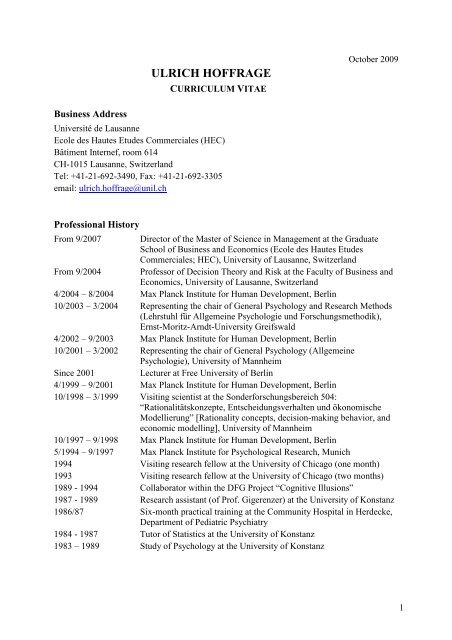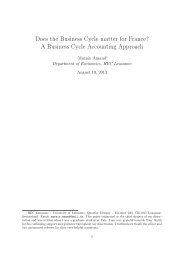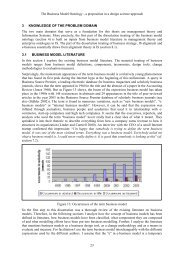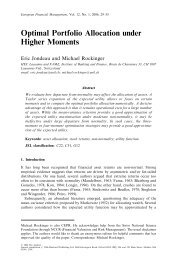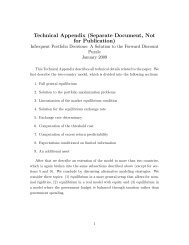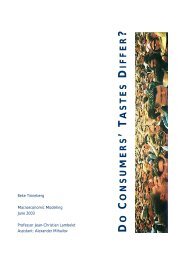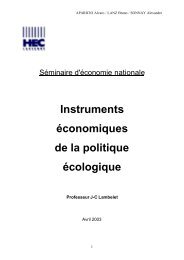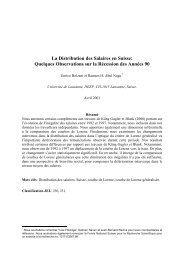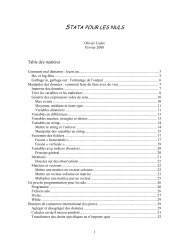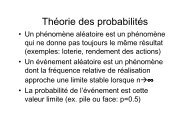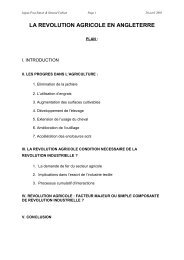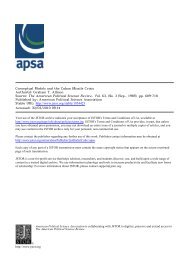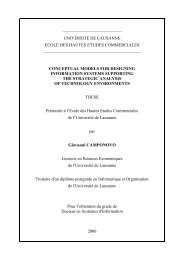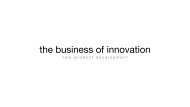ULRICH HOFFRAGE - HEC - Université de Lausanne
ULRICH HOFFRAGE - HEC - Université de Lausanne
ULRICH HOFFRAGE - HEC - Université de Lausanne
You also want an ePaper? Increase the reach of your titles
YUMPU automatically turns print PDFs into web optimized ePapers that Google loves.
Business Address<br />
<strong>ULRICH</strong> <strong>HOFFRAGE</strong><br />
CURRICULUM VITAE<br />
<strong>Université</strong> <strong>de</strong> <strong>Lausanne</strong><br />
Ecole <strong>de</strong>s Hautes Etu<strong>de</strong>s Commerciales (<strong>HEC</strong>)<br />
Bâtiment Internef, room 614<br />
CH-1015 <strong>Lausanne</strong>, Switzerland<br />
Tel: +41-21-692-3490, Fax: +41-21-692-3305<br />
email: ulrich.hoffrage@unil.ch<br />
Professional History<br />
October 2009<br />
From 9/2007 Director of the Master of Science in Management at the Graduate<br />
School of Business and Economics (Ecole <strong>de</strong>s Hautes Etu<strong>de</strong>s<br />
Commerciales; <strong>HEC</strong>), University of <strong>Lausanne</strong>, Switzerland<br />
From 9/2004 Professor of Decision Theory and Risk at the Faculty of Business and<br />
Economics, University of <strong>Lausanne</strong>, Switzerland<br />
4/2004 – 8/2004 Max Planck Institute for Human Development, Berlin<br />
10/2003 – 3/2004 Representing the chair of General Psychology and Research Methods<br />
(Lehrstuhl für Allgemeine Psychologie und Forschungsmethodik),<br />
Ernst-Moritz-Arndt-University Greifswald<br />
4/2002 – 9/2003 Max Planck Institute for Human Development, Berlin<br />
10/2001 – 3/2002 Representing the chair of General Psychology (Allgemeine<br />
Psychologie), University of Mannheim<br />
Since 2001 Lecturer at Free University of Berlin<br />
4/1999 – 9/2001 Max Planck Institute for Human Development, Berlin<br />
10/1998 – 3/1999 Visiting scientist at the Son<strong>de</strong>rforschungsbereich 504:<br />
“Rationalitätskonzepte, Entscheidungsverhalten und ökonomische<br />
Mo<strong>de</strong>llierung” [Rationality concepts, <strong>de</strong>cision-making behavior, and<br />
economic mo<strong>de</strong>lling], University of Mannheim<br />
10/1997 – 9/1998 Max Planck Institute for Human Development, Berlin<br />
5/1994 – 9/1997 Max Planck Institute for Psychological Research, Munich<br />
1994 Visiting research fellow at the University of Chicago (one month)<br />
1993 Visiting research fellow at the University of Chicago (two months)<br />
1989 - 1994 Collaborator within the DFG Project “Cognitive Illusions”<br />
1987 - 1989 Research assistant (of Prof. Gigerenzer) at the University of Konstanz<br />
1986/87 Six-month practical training at the Community Hospital in Her<strong>de</strong>cke,<br />
Department of Pediatric Psychiatry<br />
1984 - 1987 Tutor of Statistics at the University of Konstanz<br />
1983 – 1989 Study of Psychology at the University of Konstanz<br />
1
Aca<strong>de</strong>mic Qualifications<br />
Habilitation (2001, Free University of Berlin). „Urteilen und Entschei<strong>de</strong>n. Zusammenfassung<br />
und Überblick über die schriftlichen Arbeiten zur kumulativen Habilitation“ [Judging and<br />
<strong>de</strong>ciding. Summary and overview of writings on cumulative habilitations], Habilitation<br />
lecture: „Evolutionspsychologie: Eine kritische Würdigung“<br />
Promotion (Dr. Phil., 1995, University of Salzburg). Dissertation thesis: Zur Angemessenheit<br />
subjektiver Sicherheits-Urteile. Eine Exploration <strong>de</strong>r Theorie <strong>de</strong>r probabilistischen<br />
mentalen Mo<strong>de</strong>lle; [On the realism of confi<strong>de</strong>nce judgments. An exploration of the<br />
probabilistic mental mo<strong>de</strong>l theory], Graduation: summa cum lau<strong>de</strong><br />
First diploma “History and Civic Education” (1993, University of Salzburg)<br />
First diploma “German Philology” (1992, University of Salzburg)<br />
Diploma Psychology (1989, University of Konstanz). Diploma thesis: Das “Overconfi<strong>de</strong>nce” -<br />
Phänomen. Menschliche Unzulänglichkeit o<strong>de</strong>r methodisches Artefakt? [The<br />
“overconfi<strong>de</strong>nce” phenomenon. Human ina<strong>de</strong>quacy or methodological artefact?”] Diploma<br />
certificate: with high distinction<br />
Current Grants<br />
Choice <strong>de</strong>ferral: Determinants and processes. Swiss National Fund (SNF). Projekt-Nr. 100011-<br />
116111/1. Two doctoral stipends for 2 years. Start of funding: September 2007.<br />
Decision Making: ’Exploiting’ boun<strong>de</strong>d rationality. European Collaborative Research Projects<br />
in the Social Sciences (ECRP). Joint Research Project with the Pompeu Fabra University,<br />
Barcelona, Spain; University of Mannheim, Germany; and INSEAD, Fontainebleau, France.<br />
Start of funding: April 2006.<br />
Previous Grants<br />
Ökologische Rationalität: Die Theorie <strong>de</strong>r probabilistischen mentalen Mo<strong>de</strong>lle und die<br />
Be<strong>de</strong>utung externer Repräsentationsformate. [Ecological rationality: The theory of<br />
probabilistic mental mo<strong>de</strong>ls and the impact of external representation formats].<br />
Supported by the DFG (German Research Foundation) 1.1.1996-31.3.2002 (Ho 1847/1-1,<br />
Ho 1847/1-2, Ho 1847/1-3).<br />
Books, Editorships<br />
Hertwig, R, Hoffrage, U., & the ABC Research Group (in preparation). Social Heuristics That<br />
Make Us Smart (working title) (contract with Oxford University Press).<br />
Todd, P. M., Gigerernzer, G., & the ABC Research Group (in press). Ecological Rationality:<br />
Intelligence in the World (working title). Oxford University Press.<br />
Hoffrage, U. & Pohl, R. F. (Eds.) (2003). Hindsight Bias. Special Issue in Memory (Vol. 11,<br />
Issue 4/5, pp. 329–504; 11 articles).<br />
Büchel, F., Glück, J., Hoffrage, U., Stanat, P., & Wirth, J. (Hrsg.) (2002). Frem<strong>de</strong>nfeindlichkeit<br />
und Rechtsextremismus - Dokumentation einer multidisziplinären Vortragsreihe.<br />
Leverkusen: Leske und Budrich.<br />
Gigerenzer, G., Todd, P. M., & the ABC Research Group. (1999). Simple Heuristics That Make<br />
Us Ssmart. New York: Oxford University Press.<br />
2
Entries marked with "•" represent a subjective selection of the 12 most important papers<br />
Articles (incl. Comments and Replies)<br />
Berg, N. & Hoffrage, U. (in press). Compressed environments: Unboun<strong>de</strong>d optimizers should<br />
sometimes ignore information. Minds and Machines.<br />
Skubisz, C., Reimer, T., & Hoffrage, U. (2009). Communicating statistical risk information.<br />
Communication Yearbook 33. 176–211. (Published annually for the International<br />
Communication Associsiation, Editor of Volume 33: Christina S. Beck, New York: Routledge.)<br />
White, C. & Hoffrage, U. (2009). Testing the tyranny of too much choice against the allure of<br />
more choice. Psychology and Marketing, 26, 280–298.<br />
Garcia-Retamero, R. & Hoffrage, U. (2009). Influencia <strong>de</strong> las creencias causales en los<br />
procesos <strong>de</strong> toma <strong>de</strong> <strong>de</strong>cisiones (Influence of causal knowledge on <strong>de</strong>cision-making<br />
processes). Revista Mexicana <strong>de</strong> Psicología, 26(1), 103–111.<br />
• Reisen, N., Hoffrage, U., & Mast, F. (2008). I<strong>de</strong>ntifying <strong>de</strong>cision strategies in a consumer<br />
choice situation. Judgment and Decision Making, 3(8), 641–658.<br />
Berg, N. & Hoffrage, U. (2008). Rational ignoring with unboun<strong>de</strong>d cognitive capacity. Journal<br />
of Economic Psychology, 29, 792-809.<br />
Hoffrage, U., Garcia-Retamero, R., & Czienskowski, U. (2008). Compound cue processing in<br />
linearly and nonlinearly separable environments. The Psychological Record, 58, 303–316.<br />
• Rieskamp, J. & Hoffrage, U. (2008). Inferences un<strong>de</strong>r time pressure: How opportunity costs<br />
affect strategy selection. Acta Psychologica, 127, 258–276.<br />
Gigerenzer, G., Hoffrage, U., & Goldstein, D. G. (2008). Fast and frugal heuristics are plausible<br />
mo<strong>de</strong>ls of cognition: Reply to Dougherty, Franco-Watkins, and Thomas (2008).<br />
Psychological Review, 115, 230–237.<br />
Gigerenzer, G., Hoffrage, U., & Goldstein, D. G. (2008). Postscript: Fast and frugal heuristics.<br />
Psychological Review, 115, 238–239.<br />
Gigerenzer, G. & Hoffrage, U. (2007). The role of representation in Bayesian reasoning:<br />
Correcting common misconceptions [Commentary on Barbey and Sloman]. Behavioral<br />
and Brain Sciences. 30, 264–267.<br />
Garcia-Retamero, R., Hoffrage, U., & Dieckmann, A. (2007). When one cue is not enough:<br />
Combining fast and frugal heuristics with compound cue processing. Quarterly Journal of<br />
Experimental Psychology, 60(9), 1197–1215.<br />
Garcia-Retamero, R., Hoffrage, U., Dieckmann, A., & Ramos, M. M. (2007). Compound cue<br />
processing within the fast and frugal heuristics approach in non-linearly separable<br />
environments. Learning and Motivation, 38, 16–34.<br />
Reimer, T., Hoffrage, U., & Katsikopoulos, K. (2007). Entscheidungsheuristiken in Gruppen<br />
[Heuristics in group <strong>de</strong>cision-making]. NeuroPsychoEconomics, 2, 7–29.<br />
Reimer, T., Kuendig, S., Hoffrage, U., Park, E., & Hinsz, V. (2007). Effects of the information<br />
environment on group discussions and <strong>de</strong>cisions in the hid<strong>de</strong>n-profile paradigm.<br />
Communication Monographs, 74, 1–28.<br />
Garcia-Retamero, R., & Hoffrage, U. (2006). How causal knowledge simplifies <strong>de</strong>cisionmaking.<br />
Minds and Machines, 16, 365–380.<br />
Reimer, T. & Hoffrage, U. (2006). The ecological rationality of simple group heuristics: Effects<br />
of group member strategies on <strong>de</strong>cision accuracy. Theory and Decision, 60, 403–438.<br />
Reimer, T. & Hoffrage, U. (2005). Can simple group heuristics <strong>de</strong>tect hid<strong>de</strong>n profiles in<br />
randomly generated environments? Swiss Journal of Psychology, 64, 21–37.<br />
3
• Dhami, M., Hertwig, R. & Hoffrage, U. (2004). The role of representative <strong>de</strong>sign in an<br />
ecological approach to cognition. Psychological Bulletin, 130, 959–988.<br />
Hoffrage, U., & Reimer, T. (2004). Mo<strong>de</strong>ls of boun<strong>de</strong>d rationality: The approach of fast and<br />
frugal heuristics. Management Revue, 15, 437–459.<br />
• Hoffrage, U., Weber, A., Hertwig, R. & Chase, V. (2003). How to keep children save in traffic:<br />
Find the dare<strong>de</strong>vils while they are young. Journal of Experimental Psychology: Applied,<br />
11, 249–260.<br />
Hertwig, R., Fanselow, C. & Hoffrage, U. (2003). Hindsight Bias: How knowledge and<br />
heuristics affect our reconstruction of the past. Memory, 11, 357–377.<br />
Hoffrage, U. & Pohl, R. (2003). Research on Hindsight Bias: A rich past, a productive present,<br />
and a challenging future. Memory, 11, 329–335.<br />
• Hoffrage, U. (2003). Risikokommunikation bei Brustkrebsfrüherkennung und<br />
Hormonersatztherapie. [Risk communication in the early i<strong>de</strong>ntification of breast cancer<br />
and hormone-replacement therapy]. Zeitschrift für Gesundheitspsychologie, 11, 76–86.<br />
Betsch, T., Hoffmann, K., Hoffrage, U., & Plessner, H. (2003). Intuition beyond recognition:<br />
When less familiar events are liked more. Experimental Psychology, 50, 49–54.<br />
Kurzenhäuser, S. & Hoffrage, U. (2002). Teaching Bayesian reasoning: An evaluation of a<br />
classroom tutorial for medical stu<strong>de</strong>nts. Medical Teacher, 24(5), 516–521.<br />
• Martignon, L. & Hoffrage, U. (2002). Fast, frugal and fit: Simple heuristics for paired<br />
comparison. Theory and Decision, 52, 29–71.<br />
Hoffrage, U., Gigerenzer, G., Krauss, S., & Martignon, L. (2002). Representation facilitates<br />
reasoning: What natural frequencies are and what they are not. Cognition, 84, 343–352.<br />
Hoffrage, U., Lindsey, S., Hertwig, R. & Gigerenzer, G. (2001). Response to Brian<br />
Butterworth‚ ‘Statistics: What seems natural?‘ Science, 292 (5518), p. 853.<br />
Hertwig, R. & Hoffrage, U. (2001). Empirische Evi<strong>de</strong>nz für einfache Heuristiken. Eine Antwort<br />
auf Brö<strong>de</strong>r. Psychologische Rundschau, 52, 162-165.<br />
Hertwig, R. & Hoffrage, U. (2001). Eingeschränkte und ökologische Rationalität: Ein<br />
Forschungsprogramm. [Boun<strong>de</strong>d and ecological rationality: A research program]<br />
Psychologische Rundschau, 52, 11–19.<br />
• Hoffrage, U., Lindsey, S., Hertwig, R. & Gigerenzer, G. (2000). Communicating statistical<br />
information. Science, 290, 2261–2262.<br />
Hoffrage, U. (2000). Why the analysis of cognitive processes matters. Behavioral & Brain<br />
Sciences, 23, 679-680.<br />
Hoffrage, U., Kurzenhäuser, S. & Gigerenzer, G. (2000). Wie kann man die Be<strong>de</strong>utung<br />
medizinischer Testbefun<strong>de</strong> besser verstehen und kommunizieren? [How to improve the<br />
communication and un<strong>de</strong>rstanding of medical test results?], Zeitschrift für ärztliche<br />
Fortbildung und Qualitätssicherung, 94, 713–719.<br />
• Hoffrage, U., Hertwig, R. & Gigerenzer, G. (2000). Hindsight bias: A by-product of knowledge<br />
updating? Journal of Experimental Psychology: Learning, Memory, and Cognition, 26,<br />
566–581.<br />
Todd, P. M., Gigerenzer, G., and the ABC Research Group. (2000). How can we open up the<br />
adaptive toolbox? Behavioral & Brain Sciences, 23, 767-780.<br />
Gigerenzer, G., & Hoffrage, U. (1999). Overcoming difficulties in Bayesian reasoning: A reply<br />
to Lewis and Keren (1999) and Mellers and McGraw (1999). Psychological Review, 106,<br />
425-430.<br />
Hoffrage, U. & Gigerenzer, G. (1998). Using natural frequencies to improve diagnostic<br />
inferences. Aca<strong>de</strong>mic Medicine, 73, 538–540.<br />
4
• Gigerenzer, G., Hoffrage, U. & Ebert, A. (1998). AIDS counseling for low-risk clients. Aids<br />
Care, 10, 197–211.<br />
Hertwig, R., Gigerenzer, G. & Hoffrage, U. (1997). The reiteration effect in hindsight bias.<br />
Psychological Review, 104, 194–202.<br />
• Gigerenzer, G. & Hoffrage, U. (1995). How to improve Bayesian reasoning without instruction:<br />
Frequency formats. Psychological Review, 102, 684–704. Reprinted in: N. Chater (Ed.) (in<br />
press). Judgement and <strong>de</strong>cision making. London: SAGE Publications.<br />
• Gigerenzer, G., Hoffrage, U. & Kleinbölting, H. (1991). Probabilistic mental mo<strong>de</strong>ls: A<br />
Brunswikian theory of confi<strong>de</strong>nce. Psychological Review, 98, 506–528. Reprinted in W.<br />
M. Goldstein & R. M. Hogarth (Eds.) (1997). Research on judgment and <strong>de</strong>cision making:<br />
Currents, connections, and controversies (pp. 95–143). Cambridge: Cambridge University<br />
Press.<br />
Invited Articles (not peer-reviewed)<br />
Hoffrage, U. (2006). Achtung Statistik! Wissenschaftsjournalist. 18–19<br />
Hoffrage, U. (2006). Irren ist wahrscheinlich: Tücken im Umgang mit Statistik. Der<br />
Gynäkologe. (Son<strong>de</strong>rausgabe zum 56. Kongress <strong>de</strong>r Deutschen Gesellschaft für<br />
Gynäkologie und Geburtshilfe). Seite 12.<br />
Matter-Walstra, K. & Hoffrage, U. (2001). Individuelle Entscheidungsfindung am Beispiel <strong>de</strong>r<br />
Brustkrebs-Früherkennung – Erfahrungen aus Fokusgruppen in <strong>de</strong>r Schweiz. [Individual<br />
<strong>de</strong>cision making concerning breast cancer screening – observations with focus groups in<br />
Switzerland]. Schweizer Zeitschrift für Managed Care und Care Management 3/01 (5),<br />
26–29.<br />
Hoffrage, U., Kurzenhäuser, S. & Gigerenzer, G. (2001). Positive Mammographie =<br />
Brustkrebs? Von <strong>de</strong>n Schwierigkeiten im Umgang mit statistischen Informationen.<br />
[Positive mammography = breast cancer? About the difficulties to un<strong>de</strong>rstand statistical<br />
information]. Schweizer Zeitschrift für Managed Care und Care Management 3/01 (5),<br />
22–25.<br />
Hoffrage, U. (2001). Risikokommunikation in <strong>de</strong>r Medizin: Zum Wohle <strong>de</strong>s Patienten? [Risk<br />
communication in medicine: For the patient’s well-being?]. Berliner Ärzte, 38(4), 12–15.<br />
Hoffrage, U. (1999). Statistiken machen das Leben schwer. Was be<strong>de</strong>uten Befun<strong>de</strong> wirklich?<br />
[Statistics make life complicated. What test results actually mean]. Landärztliche<br />
Nachrichten 05/99, 6.<br />
Hoffrage, U., (1999). Irren ist wahrscheinlich. Medizinische Experten und Laien bewerten<br />
Risiken oft falsch. [To err is probable. Medical experts and laypeople often misjudge<br />
risks]. einblick, 13, 6–9.<br />
Peer-reviewed Conference Proceedings, Book Reviews, Contributions to<br />
Encyclopedias<br />
<strong>de</strong>Treville, S., Hoffrage, U, & Petty, J. S. (2009). Managerial <strong>de</strong>cision making and lead times:<br />
The impact of cognitive illusions. In G. Reiner (ed.), Rapid Mo<strong>de</strong>lling for Increasing<br />
Competetiveness (pp. 3–14). London: Springer.<br />
Hafenbrädl, S., Hoffrage, U., & White, C. (2008). Choosing how many options to choose from:<br />
Does it <strong>de</strong>pend on affective priming? Advances in Consumer Research, vol. XXXVI<br />
Palazzo, G., Krings, F., & Hoffrage, U. (2008). A person-situation interactionist framework for<br />
ethical blindness. Proceedings of the 2008 Annual Meeting of the Aca<strong>de</strong>my of<br />
Management.<br />
5
Hoffrage, U. (in press). Hindsight Bias. In R. Baumeister (Ed.), Encyclopedia of Social<br />
Psychology. Sage: Thousand Oaks, CA.<br />
<strong>de</strong>Treville, S., Hoffrage, U., & Petty, J. (2006). Cognitive illusions in operations managment.<br />
Proceedings of the 2006 Annual Meeting of the Aca<strong>de</strong>my of Management.<br />
White, C. & Hoffrage, U. (2006). Introducing the Two-Stage, Two-Threshold mo<strong>de</strong>l of choice<br />
<strong>de</strong>ferral. Proceedings of the IAREP/SABE Congress on Behavioural Economics and<br />
Economic Psychology, July 5th-8th, 2006, Paris, France.<br />
Hoffrage, U. (2006). Evolutionäre Ansätze. In P. Frensch & J. Funke (Hrsg.). Handbuch <strong>de</strong>r<br />
Psychologie: Kognition (S. 400–405). Göttingen: Hogrefe.<br />
Hoffrage, U., Garcia-Retamero, R., & Czienskowski, U. (2005). The robustness of the Take<br />
The Best Configural Heuristic in linearly and nonlinearly separable environments. In K.<br />
Opwis & I.-K. Perner (Eds.). Proceedings of KogWis05 – The German Cognitive Science<br />
Conference 2005 (pp. 83–88). Basel, Switzerland: Schwabe Verlag.<br />
Berg, N., & Hoffrage, U. (2005). Environmental <strong>de</strong>terminants of simple <strong>de</strong>cision rules: No<br />
cognitive limitations nee<strong>de</strong>d. In K. Opwis & I.-K. Perner (Eds.). Proceedings of KogWis05<br />
– The German Cognitive Science Conference 2005 (pp. 9–15). Basel, Switzerland:<br />
Schwabe Verlag.<br />
Hoffrage, U., Garcia-Retamero, R., & Czienskowski, U. (2005). The robustness of the Take<br />
The Best Configural Heuristic in linearly and nonlinearly separable environments. In B. G.<br />
Bara, L. Barsalou & M. Bucciarelli (Eds.). Proceedings of the CogSci2005 – XXVII<br />
Annual Conference of the Cognitive Science Society (pp. 971–976) (CD-Rom).<br />
Hoffrage, U. (2005). Heuristics. In B. C. Everitt & D. C. Howell (Eds.), Encyclopedia of<br />
Statistics in Behavioral Science (Volume 2, p. 795). Wiley: Chichester, UK.<br />
Hoffrage, U. (2005). Heuristics: Fast and frugal. In B. C. Everitt & D. C. Howell (Eds.),<br />
Encyclopedia of Statistics in Behavioral Science (Volume 2, pp. 795–799). Wiley:<br />
Chichester, UK.<br />
Reimer, T. & Hoffrage, U. (2003). Information aggregation in groups: The approach of simple<br />
group heuristics (SIGH). In R. Alterman & D. Kirsch (Eds.), Proceedings of the Twenty-<br />
Fifth Annual Conference of the Cognitive Science Society. Mahwah, NJ: Erlbaum.<br />
Hoffrage, U., Hertwig, R., & Fanselow, C. (2003). Mo<strong>de</strong>ling the hindsight bias. In F. Detje, D.<br />
Dörner, & H. Schaub (Eds.). The logic of cognitive systems. Proceedings of the Fifth<br />
International Conference on Cognitive Mo<strong>de</strong>ling (pp. 259–260). Bamberg: Universität<br />
Bamberg.<br />
Hoffrage, U. (2001). Does knowing "who is rational" tell us why and when people are<br />
irrational? (Book review of „K. Stanovich, 1999, Who is rational?“) Theory and<br />
Psychology, 11, 852–855.<br />
Hoffrage, U. & Gigerenzer, G. (1996). The impact of information representation on Bayesian<br />
reasoning. In G. Cottrell (Ed.), Proceedings of the 18th Annual Conference of the<br />
Cognitive Science Society (pp. 126–130). Mahwah, NJ: Lawrence Erlbaum.<br />
Book Chapters<br />
Reimer, T. & Hoffrage, U. (in press). Fast and frugal group heuristics. In P. M. Todd, G.<br />
Gigerenzer, and the ABC Research Group. Ecological Rationality: Intelligence in the<br />
World [Working Title]. New York: Oxford University Press.<br />
Hertwig, R. Hoffrage, U., & Sparr, R. (in press). The QuickEst heuristic: How to benefit from<br />
an imbalanced world. In P. M. Todd, G. Gigerenzer, and the ABC Research Group.<br />
Ecological Rationality: Intelligence in the World [Working Title]. New York: Oxford<br />
University Press.<br />
6
Kurzenhäuser, S. & Hoffrage, U. (in press). Designing risk communication in health. In P. M.<br />
Todd, G. Gigerenzer, and the ABC Research Group. Ecological Rationality: Intelligence<br />
in the World [Working Title]. New York: Oxford University Press.<br />
Gigerenzer, G., Martignon, L., Hoffrage, U., Rieskamp, J., Czerlinski, J. & Goldstein, D.<br />
(2008). One-reason <strong>de</strong>cision making. In C. R. Plott & V. L. Smith (Eds.), Handbook of<br />
Experimental Economics Results (Vol. 1, pp. 1004-1017). Amsterdam: North<br />
Holland/Elsevier Press.<br />
Gigerenzer, G., Hertwig, R., Hoffrage, U. & Sedlmeier, P. (2008). Cognitive illusions<br />
reconsi<strong>de</strong>red. In C. R. Plott & V. L. Smith (Eds.), Handbook of Experimental Economics<br />
Results (Vol. 1, pp. 1018-1034). Amsterdam: North Holland/Elsevier Press.<br />
• Hoffrage, U. & Vitouch, O. (2007). Evolutionäre Psychologie <strong>de</strong>s Denkens und Problemlösens<br />
[Evolutionary psychology of thinking and problem solving]. In J. Müsseler (Hrsg.),<br />
Allgemeine Psychologie. Hei<strong>de</strong>lberg: Spektrum Aka<strong>de</strong>mischer Verlag. (S. 630–679)<br />
(Überarbeitete Fassung von Hoffrage & Vitouch, 2002, siehe unten).<br />
Wassner, C., & Hoffrage, U. (2006). Irren ist wahrscheinlich: Praktische Anwendungsbeispiele<br />
zur besseren Vermittlung von Wahrscheinlichkeiten. In J. Meyer (Hrsg.). Anregungen zum<br />
Stochastikunterricht (Band 3) (S. 78–85). Hil<strong>de</strong>sheim: Franz Beck.<br />
Hoffrage, U., & Hertwig, R. (2006). Which world should be represented in representative<br />
<strong>de</strong>sign? In K. Fiedler, & P. Juslin (Eds.), Information sampling and adaptive cognition<br />
(pp. 381-408). Cambridge, NY: Cambridge University Press.<br />
Todd, P. M., Hertwig, R., & Hoffrage, U. (2005). Evolutionary cognitive psychology. In D. M.<br />
Buss (Ed.), The handbook of evolutionary psychology (pp. 776–802). Hoboken, NJ, US:<br />
John Wiley & Sons.<br />
Hoffrage, U., Hertwig, R. & Gigerenzer, G. (2005). Die ökologische Rationalität einfacher<br />
Entscheidungs- und Urteilsheuristiken. [The ecological rationality of simple <strong>de</strong>cision and<br />
judgment heuristics]. In H. Siegenthaler (Hrsg.), Rationalität im Prozess kultureller<br />
Evolution: Rationalitätsunterstellungen als eine Bedingung <strong>de</strong>r Möglichkeit<br />
substantieller Rationalität <strong>de</strong>s Han<strong>de</strong>lns (S. 65-89). Tübingen, Deutschland: Mohr<br />
Siebeck.<br />
Schlegelberger, B. & Hoffrage, U. (2005). Implikationen <strong>de</strong>r genetischen Beratung bei<br />
Hochrisiko-Familien für erblichen Brust- und Eierstockkrebs. In: Gerhardus, M. A.,<br />
Schleberger, H., Schlegelberger, B. & Schwarz, F. K., (Hrsg.). BRCA – Erblicher Brust-<br />
und Eierstockkrebs: Beratung – Testverfahren – Kosten. Berlin/Hei<strong>de</strong>lberg: Springer<br />
Verlag.<br />
- Ebenfalls veröffentlicht in: Gerhardus, A., Christ, M., Gadzicki, D., Haverkamp, A.,<br />
Hoffrage, U., Krauth, C., Schleberger, H., & Schlegelberger, B. (2004). Die<br />
molekulargenetische Diagnostik <strong>de</strong>s erblichen Brust- und Eierstockkrebs – BRCA:<br />
Beratungsprozesse – Testverfahren – Kosten. Ein Health Technology Assessment für <strong>de</strong>n<br />
Bun<strong>de</strong>sverband <strong>de</strong>r AOK. Medizinische Hochschule Hannover; Abteilung Epi<strong>de</strong>miologie,<br />
Sozialmedizin und Gesundheitssystemforschung.<br />
Hoffrage, U., Kurzenhäuser, S. & Gigerenzer, G. (2005). Un<strong>de</strong>rstanding the results of medical<br />
tests: Why the representation of statistical information matters. In R. Bibace, J. D. Laird,<br />
K. L. Noller & J. Valsiner (Eds.), Science and medicine in dialogue: Thinking through<br />
particulars and universals (pp. 83–98). Westport, Ct: Praeger Publishers.<br />
Hoffrage, U. (2004). Overconfi<strong>de</strong>nce. In R.F. Pohl (Ed.), Cognitive illusions: Fallacies and<br />
biases in thinking, judgement, and memory (pp. 235–254). Hove, UK: Psychology Press.<br />
7
Kurz-Milcke, E. M., Gigerenzer, G. & Hoffrage, U. (2004). Representations of uncertainty and<br />
change: Three case studies with experts. In K. Smith, P. Johnson & J. Shanteau (Eds.),<br />
Psychological investigations of competence in <strong>de</strong>cision making (pp. 188–225).<br />
Cambridge, U.K.: Cambridge University Press.<br />
Hoffrage, U. & Gigerenzer, G. (2004). How to improve the diagnostic inferences of medical<br />
experts. In E. Kurz-Milcke & G. Gigerenzer (Eds.), Experts in science and society (pp.<br />
249–268). New York: Kluwer Aca<strong>de</strong>mic/Plenum Publishers.<br />
Hoffrage, U. & Vitouch, O. (2002). Evolutionspsychologie <strong>de</strong>s Denkens und Problemlösens.. In<br />
J. Müsseler & W. Prinz (Hrsg.), Allgemeine Psychologie (Kapitel 5c, S. 734–794).<br />
Hertwig, R. & Hoffrage, U. (2002). Technology needs psychology: How natural frequencies<br />
foster insight in medical and legal experts. In P. Sedlmeier & T. Betsch (Eds.), Etc.<br />
Frequency processing and cognition (pp. 285–302). New York: Oxford University Press.<br />
Sadrieh, A., Güth, W., Hammerstein, P., Harnad, S., Hoffrage, U., Kuon, B., Munier, B. R.,<br />
Todd, P. M., Warglien, M. & Weber, M. (2001). Is there evi<strong>de</strong>nce for an adaptive toolbox?<br />
In G. Gigerenzer & R. Selten (Eds.), Boun<strong>de</strong>d rationality: The adaptive toolbox (pp. 83–<br />
102). Cambridge, MA: MIT University Press.<br />
Krauss, S., Martignon, L. & Hoffrage U. (1999). Simplifying Bayesian inference: The general<br />
case. In L. Magnani, N. J. Nersessian & P. Thagard (Eds.), Mo<strong>de</strong>l-based reasoning in<br />
scientific discovery (pp. 165–179). New York: Kluwer Aca<strong>de</strong>mic/Plenum Publishers.<br />
Hertwig, R., Hoffrage, U. & Martignon, L. (1999). Quick estimation: Letting the environment<br />
do the work. In G. Gigerenzer, P. M. Todd and the ABC Research Group. Simple<br />
Heuristics that Make Us Smart (pp. 209–234). New York: Oxford University Press.<br />
Hoffrage, U. & Hertwig, R. (1999). Hindsight bias: A price worth paying for fast and frugal<br />
memory. In G. Gigerenzer, P. M. Todd and the ABC Research Group. Simple Heuristics<br />
that Make Us Smart (pp. 191–208). New York: Oxford University Press.<br />
Rieskamp, J. & Hoffrage, U. (1999). When do people use simple heuristics, and how can we<br />
tell? In G. Gigerenzer, P. M. Todd and the ABC Research Group. Simple Heuristics that<br />
Make Us Smart (pp. 141–167). New York: Oxford University Press.<br />
Martignon, L. & Hoffrage, U. (1999). Why does one-reason <strong>de</strong>cision making work? A case<br />
study in ecological rationality. In G. Gigerenzer, P. M. Todd and the ABC Research<br />
Group. Simple Heuristics that Make Us Smart (pp. 119–140). New York: Oxford<br />
University Press.<br />
Hoffrage, U. (1993). Die Illusion <strong>de</strong>r Sicherheit bei Entscheidungen unter Unsicherheit. [The<br />
illusion of certainty in <strong>de</strong>cisions un<strong>de</strong>r uncertainty]. In: W. Hell, K. Fiedler & G.<br />
Gigerenzer (Hrsg.), Kognitive Täuschungen (S. 73–97). Hei<strong>de</strong>lberg: Spektrum<br />
Aka<strong>de</strong>mischer Verlag.<br />
Further Publications and "Grey" Literature<br />
Buss, D. M. (2004). Evolutionäre Psychologie (608 pages). Munich: Pearson Studium<br />
Deutschland. Scientific supervision of the German translation.<br />
Hoffrage, U. et al. (2003). Center for Adaptive Behavior and Cognition. In Max Planck Institute<br />
for Human Development (Ed.), Institute Report 2001-2002 (pp. 24–58). Berlin: Max<br />
Planck Institute for Human Development.<br />
Hoffrage, U. (2002). Eingeschränkte Rationalität. [Boun<strong>de</strong>d rationality]. In Max-Planck-<br />
Gesellschaft (Hrsg.), Max-Planck-Gesellschaft - Jahrbuch 2001 (S. 724-730).<br />
Hoffrage, U. (2001). Informationssuche im Internet. [Information search in the internet]. (38<br />
Seiten + 42 Seiten Anhang). Expert report for the "Stiftung Warentest" (Germany´s<br />
"Consumer Reports")<br />
8
Hoffrage, U. et al. (2001). Center for Adaptive Behavior and Cognition. In Max Planck Institute<br />
for Human Development (Ed.), Institute Report 1998–2000 (pp. 23–57). Berlin: Max<br />
Planck Institute for Human Development.<br />
Lages, M., Hoffrage, U. & Gigerenzer, G. (2000). How heuristics produce intransitivity and<br />
how intransitivity can discriminate between heuristics. Working Paper. Max-Planck-<br />
Institut für Bildungsforschung, Berlin.<br />
Maurer, R. & Hoffrage, U. (1999). An expected utility approach to probabilistic insurance: A<br />
comment on Wakker, Thaler, and Tversky (1997). Son<strong>de</strong>rforschungsbereich 504,<br />
University Mannheim, Publication 99–31.<br />
Hoffrage, U. & Gigerenzer, G. (1999). Adaptives Verhalten und Kognition [Adaptive behavior<br />
and cognition]. In Max-Planck-Gesellschaft (Hrsg.), Max-Planck-Gesellschaft - Berichte<br />
und Mitteilungen - Heft 4/1998: Max-Planck-Institut für psychologische Forschung (S.<br />
73–89). Max-Planck-Gesellschaft: München.<br />
Gigerenzer, G. & Hoffrage, U. (1998). Wie kann man Risiken besser verstehen und<br />
kommunizieren? [How can one better un<strong>de</strong>rstand and communicate risks?].<br />
Informationsbroschüre. Max-Planck-Institut für Bildungsforschung, Berlin.<br />
Gigerenzer, G. & Hoffrage, U. (1996). Rationales Urteilen unter Unsicherheit [Rational<br />
<strong>de</strong>cision making un<strong>de</strong>r uncertainty]. In Max-Planck-Gesellschaft (Hrsg.), Max-Planck-<br />
Gesellschaft - Jahrbuch 1996 (S. 682–686). Göttingen: Van<strong>de</strong>nhoeck & Ruprecht.<br />
Manuscripts Submitted for Publication<br />
Garcia-Retamero, R., Hoffrage, U., Müller, S. M., & Maldonado, A. (2009). Insights and<br />
prospects about the influence of causal knowledge in <strong>de</strong>cision making.<br />
Hoffrage, U. (2009). Recognition judgments and the performance of the recognition heuristic<br />
<strong>de</strong>pend on the size of the reference class.<br />
White, C., Hafenbrädl, S., Hoffrage, U. Reisen, N., & Woike, J. (2009). Do individuals <strong>de</strong>fer<br />
choice more often than groups?<br />
In Revision<br />
Garcia-Retamero, R., Maldonado, A., Catena, A., Hoffrage, U., Herrera, A., & Candido, A.<br />
(2006). The influence of causal beliefs and empirical evi<strong>de</strong>nce on <strong>de</strong>cision making and<br />
causal attribution. Quarterly Journal of Experimental Psychology.<br />
Gonin, M., Palazzo, G., & Hoffrage, U. (2007). Homo Economicus unchained.Journal of<br />
Business Ethics.<br />
Working Papers<br />
Reisen, N., & Hoffrage, U. (2009). The InterActive Choice Aid: A new approach for the<br />
support of online consumer <strong>de</strong>cision making.<br />
White, C., Reisen, N., & Hoffrage, U. (2009). Choice <strong>de</strong>ferral arising from absolute evaluation<br />
or relative comparison.<br />
Palazzo, G., Krings, F., & Hoffrage, U. (2009). Ethical blindness.<br />
Hafenbrädl, S., White, C., & Hoffrage, U. (2007). Choosing how many options to choose from:<br />
Does it <strong>de</strong>pend on affective priming?<br />
9
Hoffrage U., Martignon, L., Krauss, S., & Gigerenzer, G. (2008). Bayesian reasoning and<br />
natural frequencies: Generalization to complex situations.<br />
Hertwig, R. & Hoffrage, U. (2009). The ABC of Social Rationality: A Research Program.<br />
Introductory chapter to Hertwig, R., Hoffrage, U. and the ABC Research Group (in<br />
preparation). Social Heuristics that Make Us Smart.<br />
Reimer, T., Reimer, A., & Hoffrage, U. (2009). Simple heuristics and information sharing in<br />
groups: How groups can solve the hid<strong>de</strong>n-profile task. Chapter for Hertwig, R., Hoffrage,<br />
U. and the ABC Research Group (in preparation). Social Heuristics that Make Us Smart.<br />
Berg, N., Katarzyna, A. & Hoffrage, U. (2009) Fast acceptance by common experience: FACErecognition<br />
in Schelling’s mo<strong>de</strong>l of neighborhood segregation. Chapter for Hertwig, R.,<br />
Hoffrage, U. and the ABC Research Group (in preparation). Social Heuristics that Make<br />
Us Smart.<br />
Teaching (WS = winter semester, SS = summer semester)<br />
Unethical Decision Making, University of <strong>Lausanne</strong>, WS 09/10.<br />
Theories of Organizations, University of <strong>Lausanne</strong>, PhD course, SS 08, SS 09.<br />
Psychology of Risk, Lecture, University of <strong>Lausanne</strong>, SS 06, WS 06/07, WS 07/08.<br />
Psychology of Risk, Seminar, University of <strong>Lausanne</strong>, SS06, WS 06/07.<br />
Managerial Decision Making and Negotiations, MBA program, University of <strong>Lausanne</strong>, SS 06, SS 07.<br />
Managerial Decision Making and Negotiations, Executive-MBA program, University of <strong>Lausanne</strong>,<br />
WS 07/08, WS 08/09.<br />
Managerial Decision Making, Lecture, University of <strong>Lausanne</strong>, WS 05/06, WS 06/07, WS 07/08,<br />
WS 08/09, WS 09/10.<br />
Managerial Decision Making, Seminar, University of <strong>Lausanne</strong>, WS 05/06 WS 06/07, WS 07/08,<br />
WS 08/09.<br />
Rational Judgment and Choice, University of <strong>Lausanne</strong>, WS 09/10.<br />
Judgment and Decision Making, Lecture, University of <strong>Lausanne</strong>, SS 05, SS 06, SS 07, SS 08, SS 09.<br />
Risk Theory, Lecture, University of <strong>Lausanne</strong>, SS 05.<br />
Risk Theory, Seminar, University of <strong>Lausanne</strong>, SS 05.<br />
Kognitionspsychologie I, Vorlesung, Universität Greifswald, WS 03/04.<br />
Ausgewählte Aspekte <strong>de</strong>r Kognitionspsychologie, Seminar, Universität Greifswald, WS 03/04.<br />
Urteilen und Entschei<strong>de</strong>n, Seminar, Universität Greifswald, WS 03/04.<br />
Experimentalpsychologisches Praktikum (4 Gruppen), Universität Greifswald, WS 03/04.<br />
Urteilen und Entschei<strong>de</strong>n, Seminar, Freie Universität Berlin, SS 03.<br />
Menschenbil<strong>de</strong>r in <strong>de</strong>r Psychologie, Seminar, Freie Universität Berlin, WS 02/03.<br />
Psychologie <strong>de</strong>s Denkens und <strong>de</strong>r Sprache, Vorlesung, Universität Mannheim, WS 01/02.<br />
Ausgewählte Aspekte <strong>de</strong>r Allg. Psychologie I, Seminar, Universität Mannheim, WS 01/02.<br />
Experimentalpsychologisches Praktikum (6 Gruppen), Universität Mannheim, WS 01/02.<br />
Evolutionspsychologie, Seminar, Freie Universität Berlin, WS 01/02.<br />
Denken, Seminar, Freie Universität Berlin, WS 00/01.<br />
Risikokommunikation und -verhalten, Seminar, Freie Universität Berlin, WS 00/01.<br />
Denken, Urteilen, Entschei<strong>de</strong>n, Seminar, Freie Universität Berlin, SS 00.<br />
Fehler und Fallen in Methodik und Statistik, Seminar, Freie Universität Berlin, WS 99/00.<br />
Aspekte sozialer Rationalität, Seminar, Universität Mannheim, WS 98/99.<br />
Experten und Expertensysteme, Seminar, Freie Universität Berlin, SS 99.<br />
10
Mo<strong>de</strong>lle begrenzter Rationalität, Seminar, Freie Universität Berlin, SS 99.<br />
Urteilen und Entschei<strong>de</strong>n, Proseminar, Universität Salzburg, SS 93.<br />
Denkpsychologie, Vorlesung, Universität Salzburg, SS 92.<br />
Allgemeine Psychologie, Proseminar, Universität Salzburg, WS 92/93.<br />
Übung zu Statistik II, Universität Salzburg, WS 91/92, WS 92/93.<br />
Allgemeine Psychologie, Proseminar, Universität Salzburg, WS 91/92.<br />
Übung zu Statistik I, Universität Salzburg, SS 92.<br />
Statistik Tutorien (I und II), Universität Konstanz, WS 84/85, SS 85, WS 85/86, SS 86, SS 87.<br />
Poster Presentations<br />
Reisen, N. & Hoffrage, U. (2008). Online Purchase Decisions: How Much Influence on<br />
Information Display Do Consumers Desire? Annual Meeting of the Society for Judgment<br />
and Decision Making, Chicago (IL), USA, November 2008.<br />
Woike, J. K., Hoffrage, U., & Hertwig, R. (November 2008). Reverse engineering and its<br />
problems: Separating <strong>de</strong>cision strategies based on their outcomes. Annual Meeting of the<br />
Society for Judgment and Decision Making, Chicago (IL), USA, November 2008.<br />
Hafenbrädl, S. & Hoffrage, U. (November 2008). Choosing how many options to choose from:<br />
Is there such a thing as a <strong>de</strong>sired-set-size? Annual Meeting of the Society for Judgment<br />
and Decision Making, Chicago (IL), USA, November 2008.<br />
Hafenbrädl, S., Hoffrage, U., & White, C. (2008). Choosing how many options to choose from:<br />
Does it <strong>de</strong>pend on affective priming? Association for Consumer Research North<br />
American Conference, San Francisco. October 2008<br />
Hafenbrädl, S., Hoffrage, U., & White, C. (2008). Choosing how many options to choose from:<br />
Does it <strong>de</strong>pend on affective priming? XXIX. International Congress of Psychology,<br />
Berlin. July 2008.<br />
Hafenbrädl, S., Hoffrage, U., & White, C. (2008). Affective <strong>de</strong>cision making in consumer<br />
choice. XXIX. International Congress of Psychology, Berlin. July 2008.<br />
Hoffrage, U., White, C., & Reisen, N. (2008). Choice <strong>de</strong>ferral arising from absolute evaluation<br />
or relative comparison. XXIX. International Congress of Psychology, Berlin. July 2008.<br />
Hafenbrädl, S., Hoffrage, U., & White, C. (2007). Choosing how many options to choose from:<br />
Does it <strong>de</strong>pend on affective priming? Society for Judgment and Decision Making<br />
Conference, Long Beach, California. November 2007.<br />
Reisen, N. & Hoffrage, U. (2007). I<strong>de</strong>ntifying <strong>de</strong>cision strategies in a consumer choice<br />
situation. Society for Judgment and Decision Making Conference, Long Beach,<br />
California. November 2007.<br />
Hafenbrädl, S., Hoffrage, U., & White, C. (2006). Affective <strong>de</strong>cision making in consumer<br />
choice. Affect, Motivation and Decision Making Conference, 12.-15.12.2006, Ein Boqeq,<br />
The Dead Sea, Israel<br />
Reisen, N. & Hoffrage, U. (2006). I<strong>de</strong>ntifying <strong>de</strong>cision strategies in a consumer choice<br />
situation. Summer Institute on Boun<strong>de</strong>d Rationality, Max Planck Institute for Human<br />
Development, Berlin, August 11th-18th, 2006, Berlin.<br />
Reisen, N. & Hoffrage, U. (2006). I<strong>de</strong>ntifying <strong>de</strong>cision strategies in a consumer choice<br />
situation. IAREP/SABE Congress on Behavioural Economics and Economic Psychology,<br />
July 5th-8th, 2006, Paris, France.<br />
11
Garcia-Retamero, R. & Hoffrage, U. (2005). Causality within the fast and frugal heuristic<br />
approach. XIV th Conference of the European Society for Cognitive Psychology, 31.8.-<br />
3.9.2005, Lei<strong>de</strong>n, The Netherlands.<br />
Garcia-Retamero, R. & Hoffrage, U. (2005). The Take The Best Configural Heuristic: A fast<br />
and frugal heuristic that processes compound cues as configurations. XIV th Conference<br />
of the European Society for Cognitive Psychology, 31.8.-3.9.2005, Lei<strong>de</strong>n, The<br />
Netherlands.<br />
Hoffrage, U., Garcia-Retamero, R., & Czienskowski, U. (2005). The robustness of the Take The<br />
Best Configural Heuristic in linearly and nonlinearly separable environments. XXVII<br />
Annual Conference of the Cognitive Science Society, 21-23.7.2005, Stresa, Italy.<br />
Hoffrage, U., et al. (2004). Wissen Versuchspersonen um ihre Overconfi<strong>de</strong>nce bei<br />
Intervallschätzungen? 44. DGPs Kongress, September, Göttingen.<br />
Reimer, T. & Hoffrage, U. (2003). The approach of simple group heuristics. 8. Kongress <strong>de</strong>r<br />
Schweizerischen Gesellschaft für Psychologie, 14.-15.10.2003, Universität Bern.<br />
Reimer, T. & Hoffrage, U. (2003). The ecological rationality of simple group heuristics.<br />
Tagung <strong>de</strong>r DGPs-Fachgruppe Sozialpychologie, 22.-24.9.03, Hei<strong>de</strong>lberg<br />
Hoffrage, U., Hertwig, R., & Fanselow, C. (2003). Mo<strong>de</strong>ling the hindsight bias. Fifth<br />
International Conference on Cognitive Mo<strong>de</strong>ling, 10.-12.4.2003, Bamberg, Germany.<br />
Hoffrage, U., Kurzenhäuser, S., & Gigerenzer, G. (2003). Evi<strong>de</strong>nz-basierte Kommunikation von<br />
Risiken in <strong>de</strong>r Medizin. Viertes Symposium für Evi<strong>de</strong>nz-basierte Medizin, 14.-15.3.2003,<br />
Freiburg/i. Brsg..<br />
Wilke, A. & Hoffrage, U. (2002). Emotional adaptations for judgment and choice. Human<br />
Behavior and Evolution Society, 19-23.6.2002, Rutgers University, New Jersey.<br />
Hirschmüller, A., Kusch, R., Metzroth, K., Vent, S. & Hoffrage, U. (2002). Senken<br />
Betrugskontexte die Wahrscheinlichkeitseinschätzungen bei Bayesianischen Inferenzaufgaben?<br />
44. Tagung experimentell arbeiten<strong>de</strong>r Psychologen, Chemnitz.<br />
Fanselow, C., Hertwig, R. & Hoffrage, U. (2002). Zur Abhängigkeit <strong>de</strong>s Rückschaufehlers von<br />
Umfang und Richtigkeit <strong>de</strong>r Wissensbasis. 44. Tagung experimentell arbeiten<strong>de</strong>r<br />
Psychologen, Chemnitz.<br />
Bräutigam, J., Dirks, I., Kroneisen, M. & Hoffrage, U. (2002). Der Rückschaufehler im Lichte<br />
von Bartlett’s Theorie <strong>de</strong>s konstruktiven Gedächtnisses. 44. Tagung experimentell<br />
arbeiten<strong>de</strong>r Psychologen, Chemnitz.<br />
Koubenec, H.-J. & Hoffrage, U. (2001). Irren ist wahrscheinlich. Auch Ärzte bewerten Risiken<br />
oft falsch. Jahrestagung Deutsche Gesellschaft für Senologie, Berlin, November 2001.<br />
Kurzenhäuser, S. & Hoffrage, U. (2001). How physicians estimate utilities and risks of<br />
mammography screening. SPUDM-18, August 2001, Amsterdam, The Netherlands.<br />
Koubenec, H.-J. & Hoffrage, U. (2000). Mammographie-Screening: Warum überschätzen wir<br />
<strong>de</strong>n Nutzen? [Mammography screening: Why do we overestimate its usefulness?].<br />
Senologie 2000, Lugano, Schweiz, Juli 2000.<br />
Hoffrage, U. & Martignon, L. (2000). Zur ökologischen Rationalität einfacher Heuristiken<br />
[Ecological rationality of simple heuristics]. 42. Tagung experimentell arbeiten<strong>de</strong>r<br />
Psychologen, Braunschweig, April 2000.<br />
Martignon, L., Hoffrage, U. & Goldstein, G. (1999). Environment structure that influence<br />
heuristic performance. Society for Judgment and Decision Making Meeting, November<br />
1999.<br />
Hoffrage, U., Martignon, L. & Hertwig, R. (1998). Zur Abgrenzbarkeit verschie<strong>de</strong>ner<br />
Algorithmen. Ein methodisches Problem mit zwei Implikationen für empirische Forschung<br />
[How to distinguish between different algorithms. A methodological problem with two<br />
implications for empirical research]. 41. Kongreß <strong>de</strong>r <strong>de</strong>utschen Gesellschaft für<br />
Psychologie, Dres<strong>de</strong>n, September 1998.<br />
12
Rieskamp, J. & Hoffrage, U. (1997). What can we learn from the MouseLab? SPUDM-16,<br />
Leeds, UK, August 1997.<br />
Hoffrage, U. & Gigerenzer, G. (1997). Bayesian reasoning in ecological contexts: The impact<br />
of information representation for physicians. SPUDM-16, Leeds, UK, August 1997.<br />
Hoffrage, U., Martignon, L. & Hertwig, R. (1997). Does “judgment policy capturing” really<br />
capture the policies? SPUDM-16, Leeds, UK, August 1997.<br />
Hoffrage, U. & Gigerenzer, G. (1996). Bayesian reasoning in ecological contexts: The impact<br />
of information representation for physicians. Society for Judgment and Decision Making<br />
Meeting, November 1996.<br />
Hertwig, R. & Hoffrage, U. (1996). Cognitive reconstruction in hindsight: A mo<strong>de</strong>l and an<br />
experiment. Eighteenth Annual Conference of the Cognitive Science Society, San Diego,<br />
July 1996.<br />
Hoffrage, U. (1995). The theory of probabilistic mental mo<strong>de</strong>ls: A review in honor to its fifth<br />
birthsday. SPUDM-15, Jerusalem, August 1995.<br />
Organized Workshops and Symposia<br />
Applied Decision Sciences and Economics. Workshop, University of <strong>Lausanne</strong>, December 3-4,<br />
2009. Participants: ca. 15 assistants and stu<strong>de</strong>nts of Profs. Hoffrage (Univ. <strong>Lausanne</strong>),<br />
Ralph Hertwig (Univ. Basel) and Jörg Rieskamp (Univ. Basel) (Organizer: U. Hoffrage).<br />
Decision Making: ’Exploiting’ boun<strong>de</strong>d rationality. Workshop in the context of the European<br />
Collaborative Research Projects in the Social Sciences (ECRP). Participants: Project<br />
members from the Pompeu Fabra University, Barcelona, Spain; University of Mannheim,<br />
Germany; and INSEAD, Fontainebleau, France. April 18-19, 2008, <strong>Lausanne</strong>,<br />
Switzerland. (Organizer: U. Hoffrage).<br />
Consumer Psychology. Symposium at the 10 th Congress of the Swiss Society of Psychology,<br />
September 13-14, 2007, Zürich, Switzerland. (Organizer: U. Hoffrage) .<br />
Heuristics in Decision Making. Symposium at the 10 th Congress of the Swiss Society of<br />
Psychology, September 13-14, 2007, Zürich, Switzerland. (Organizer: U. Hoffrage)<br />
Social Rationality. Workshop in the process of preparing a book on Social Rationality (jointly<br />
written by Ralph Hertwig, Ulrich Hoffrage and the ABC Research Group); <strong>Lausanne</strong>,<br />
Switzerland, September 10-12, 2007. (Organizers: U. Hoffrage and R. Hertwig).<br />
Social Rationality. Workshop in the process of preparing a book on Social Rationality (jointly<br />
written by Ralph Hertwig, Ulrich Hoffrage and the ABC Research Group); A<strong>de</strong>lbo<strong>de</strong>n,<br />
Switzerland, February 20-24, 2006. (Organizers: R. Hertwig and U. Hoffrage).<br />
Adaptive functions of human memory. Annual Meeting 2004 of the Human Behavior and<br />
Evolution Society, Berlin, 21.-25.7.2004. (Organizer: U. Hoffrage).<br />
Ecological rationality of simple heuristics. Symposium auf <strong>de</strong>r SPUDM-19, ETH-Zürich,<br />
August 2003. (Organizers: U. Hoffrage and R. Hertwig).<br />
Einfache Klassifikationsbäume für die medizinische Diagnostik. September 11, 2001, Berlin.<br />
(Organizer: U. Hoffrage).<br />
3. Hindsight Workshop. July 13-14, 2001, Berlin. (Organizer: U. Hoffrage).<br />
2. Hindsight Workshop. November 3–5, 2000 in Rauischholzhausen (near Marburg, Germany).<br />
(Organizers: R. Pohl and U. Hoffrage).<br />
Bayesianische Inferenzen. Working group at the 42nd Kongress <strong>de</strong>r DGPs, Jena, September<br />
2000. (Organizer: U. Hoffrage).<br />
16 th Meeting of the Brunswikian Society. July 20–22, 2000, Berlin. (Organizers: U. Hoffrage,<br />
R. Hertwig, and G. Gigerenzer).<br />
13
Die Medizin nach 2000: Verunsicherung duch Abklärung – Mut durch Aufklärung? Schritte aus<br />
<strong>de</strong>r Absicherungsillusion. 4th Wissenschaftliches Einsiedler Symposium, Einsie<strong>de</strong>ln,<br />
Switzerland, May 18–21, 2000 (Member of the Organization Committee)<br />
Simple Heuristics that Make Us Smart. Symposium at the SPUDM-17, August 1999,<br />
Mannheim. (Organizer: U. Hoffrage).<br />
1. Mannheimer Hindsight Workshop. July 2–4, 1999 in Lambrecht/Pfalz. (Organizers: U.<br />
Hoffrage, R. Pohl, and D. Stahlberg).<br />
Mo<strong>de</strong>ls of Satisficing Inference. Symposium at the SPUDM-16, August 1997, Leeds, UK.<br />
(Organizers: R. Hertwig, U. Hoffrage, and L. Martignon).<br />
Mo<strong>de</strong>lle begrenzter Rationalität als Mo<strong>de</strong>lle kognitiver Prozesse. Workshop at the 39th Tagung<br />
experimentell arbeiten<strong>de</strong>r Psychologen, March 1997, Berlin. (Organizers: U. Hoffrage, R.<br />
Hertwig, and L. Martignon).<br />
Brunswik heute: Mo<strong>de</strong>lle Cue-gestützter Inferenzen. Workshop at the 38th Tagung<br />
experimentell arbeiten<strong>de</strong>r Psychologen, April 1996, Eichstätt. (Organizers: U. Hoffrage<br />
and R. Hertwig).<br />
Invited Talks<br />
Visions of rationality. Decisions, Games, Logic 2009, University of <strong>Lausanne</strong>, June 16 th , 2009.<br />
From judgment and <strong>de</strong>cision making to integrative risk managment. ETH-Zürich, June 12 th , 2009.<br />
Decisions un<strong>de</strong>r risk. Colloqium Mind The Brain, CHUV (Medical Faculty of the University of<br />
<strong>Lausanne</strong>), March 9 th , 2009.<br />
Does policy capturing really capture the policies? (with Jan K. Woike) The Original Brunswik,<br />
University of Landau, July 2008.<br />
Choice <strong>de</strong>ferral arising from absolute evaluation or relative comparison (with Chris White and Nils<br />
Reisen as coauthors). Formal Mo<strong>de</strong>ls in Memory, Judgment and Decision Making, University of<br />
Mannheim, Germany, July 2008.<br />
Simple heuristics in a social context. Seminar “L´esprit <strong>de</strong>s autres”, organized by the group<br />
“Determinism et liberté”, University of <strong>Lausanne</strong>, May 28 th , 2008.<br />
Invited Expert to the Workshop „Delphi-Befragung zur Wahrnehmung und Priorisierung von Risiken<br />
aus <strong>de</strong>m Bereich <strong>de</strong>s Gesundheitlichen Verbraucherschutzes“, Prognos AG Berlin, 28.1.2008<br />
Affective <strong>de</strong>cision making in consumer choice. Department of Psychology, University of Geneva, Nov<br />
13 th , 2007.<br />
Inferences un<strong>de</strong>r time pressure: How opportunity costs affect strategy selection. Department of<br />
Managment - Seminar, University of <strong>Lausanne</strong>, Nov 2 nd , 2007.<br />
Introduction to Boun<strong>de</strong>d Rationality. Advanced Game Theory Seminar, organized by the<br />
Interdisciplinary Game Theory Group, University of <strong>Lausanne</strong>, April 26 th , 2007.<br />
Choice Deferral: Determinants and Processes. University of Fribourg, Psychological Colloquium,<br />
March 19, 2007.<br />
Lügen mit Statistiken: Wie können wir uns wehren? Hauptvortrag auf <strong>de</strong>m 56.Kongress <strong>de</strong>r Deutschen<br />
Gesellschaft für Gynäkologie und Geburtshilfe (DGGG), ICC Berlin, September 19-22, 2006.<br />
Irren ist wahrscheinlich: Vom Umgang mit Risiken. Vortrag und Mo<strong>de</strong>ration <strong>de</strong>s anschließen<strong>de</strong>n<br />
Workshops „Hilfsmittel für Kommunikation von Nutzen und Risiken in <strong>de</strong>r Praxis“.<br />
Fortbildungsseminar 2006 <strong>de</strong>s MediX-Ärztenetzes, Winterthur, September 8, 2006.<br />
Brustkrebs-Früherkennung umd Mammographie-Screnning: Podiumsdiskussion. Invited Member of<br />
Panel Discussion, City of Munich, Rathaus, October 18, 2005.<br />
ABC goes to Business School: From inference to preference. Workshop "Adaptive Behavior and<br />
Cognition: Past, Present and Future of Adaptive Thinking". Max Planck Institute for Human<br />
Development, Berlin, October 13-15, 2005.<br />
Hindsight Bias und adaptive Gedächtnisprozesse. Forschungskolloquium, Institut für Psychologie,<br />
Technische Universität Berlin, December 1, 2004.<br />
14
Irren ist wahrscheinlich: Praktische Anwendungsbeispiele zur besseren Vermittlung von<br />
Wahrscheinlichkeiten. Herbsttagung <strong>de</strong>s Arbeitskreises „Stochastik in <strong>de</strong>r Schule“ in <strong>de</strong>r GDM<br />
(Gesellschaft für Didaktik in <strong>de</strong>r Mathematik), Reinhardswaldschule Kassel, November 5-7,<br />
2004.<br />
Risikokommunikation. Institut für Allgemeine Medizin, Charite Berlin, May 17, 2004.<br />
Risikokommunikation in <strong>de</strong>r Medizin. Institut für Medizin, Pflegepädagogik und Pflegewissenschaften,<br />
Charite Berlin, May 14, 2004.<br />
Einfache Entscheidungstrategien in <strong>de</strong>r Medizin. Institut für Medizin, Pflegepädagogik und<br />
Pflegewissenschaften, Charite Berlin, May 14, 2004.<br />
Der Rückschaufehler als Nebenprodukt adaptiver Prozesse. Universität Chemnitz, May 11, 2004.<br />
Fast and frugal heuristics in medicine. February 4, 2004, Vortrag im „Seminar on diagnostic research<br />
methods“ (Horten-Zentrum für praxisorientierte Forschung und Wissenstransfer,<br />
Universitätsspital Zürich).<br />
Verarbeitung und Verständnis von statistischen Informationen im medizinischen Kontext.<br />
Fachkolloquium Psychologie, Oktober 28, 2003, Universität Greifswald.<br />
Teilnehmer <strong>de</strong>r Podiumsdiskussion „Die zukünftige Entwicklung <strong>de</strong>r Sozialpsychologie zwischen<br />
Neurowissenschaft, Evolutionsforschung und Angewandter Psychologie“, Tagung <strong>de</strong>r DGPs-<br />
Fachgruppe Sozialpychologie, September 22-24, 2003, Hei<strong>de</strong>lberg.<br />
Decision mechanisms in groups. Coauthor of T. Reimer's talk presented at the workshop “ABC meets<br />
ELSE”, London, June 19 – 20, 2003.<br />
Professional diagnosis: The role of heuristics und Uncovering tacit knowledge: Methodological<br />
consi<strong>de</strong>rations. 2 Vorträge im Workshop “Uncovering the secrets of everyday work – Tacit<br />
knowledge and rules of thumb in medical <strong>de</strong>cisions. Abteilung für Allgemeinmedizin, Präventive<br />
und Rehabilitative Medizin, Philipps-Universität Marburg. June 24, 2003.<br />
Risikoabschätzung – Lernen mit <strong>de</strong>r Ungewißheit zu leben. Septischer Schock – Medan Workshop<br />
2003, April 4, 2003, Universitätsklinikum Frankfurt/Main.<br />
Fast and frugal heuristics. February 20, 2003, Vortrag im „Seminar on diagnostic research methods“<br />
(Horten-Zentrum für praxisorientierte Forschung und Wissenstransfer, Universitätsspital Zürich).<br />
Kommunikation von Risiken in <strong>de</strong>r Medizin. Rescue-Fachkongress, organized at Bezirksärztekammer<br />
Nordwürttemberg, January 31 – February 2, 2003, Stuttgart-Killesberg/Messe.<br />
Fast, frugal, and fit: Simple heuristics as mo<strong>de</strong>ls of boun<strong>de</strong>d rationality. "Berlin Workshop on Boun<strong>de</strong>d<br />
Intelligent Exten<strong>de</strong>d Rationality", January 18-19, 2003, Humboldt University, Berlin,<br />
Die Illusion von Gewissheit. Gesellschaft 1947, Oktober 16, 2002, Bremerhaven.<br />
Teilnehmer <strong>de</strong>r Podiumsdiskussion „Evolutionary Psychology: A revolutionary paradigm?“, 43.<br />
Kongreß <strong>de</strong>r <strong>de</strong>utschen Gesellschaft für Psychologie, Berlin.<br />
Risk communication in medicine: Numbers and emotions (together with S. Kurzenhäuser). Summer<br />
Institute on Boun<strong>de</strong>d Rationality and Emotions, August 21, 2002, Max Planck Institute for<br />
Human Development.<br />
Wie kann man Risiken besser verstehen und kommunizieren? Plenarvortrag für <strong>de</strong>n 5. Grund- und<br />
Aufbaukurs in Evi<strong>de</strong>nce-Based Medicine, June 21, 2002, Charité, Universitätsklinikum <strong>de</strong>r<br />
Humboldt-Universität zu Berlin.<br />
Sampling in a J-shaped World (as Co-autor of R. Hertwig). Workshop on „Information sampling as a<br />
key to un<strong>de</strong>rstanding adaptive cognition in an uncertain environment”, organized by P. Juslin &<br />
K. Fiedler, May 2-5, 2002, University of Hei<strong>de</strong>lberg.<br />
How sampling of stimuli affects theories about cognitive processes. (with R. Hertwig). Workshop on<br />
„Information sampling as a key to un<strong>de</strong>rstanding adaptive cognition in an uncertain<br />
environment”, organized by P. Juslin & K. Fiedler, May 2-5, 2002, University of Hei<strong>de</strong>lberg.<br />
Information braucht Repräsentation – Perspektiven einer ökologischen Rationalität, February 20, 2002,<br />
Universität Leipzig.<br />
Eingela<strong>de</strong>ner Diskutant zum Kolloquium “Diagnostische Forschungsmetho<strong>de</strong>n: Wege zur<br />
verständlichen Darstellung <strong>de</strong>r Resultate diagnostischer Studien”. February 14-15, 2002,<br />
Universitätsspital Zürich.<br />
Wie kann man die Be<strong>de</strong>utung medizinischer Testbefun<strong>de</strong> besser verstehen und kommunizieren? 60.<br />
Neuköllner Fortbildungskurs für Ärztinnen und Ärzte über aktuelle Fragen <strong>de</strong>r Schwangerschafts-<br />
und Geburtsmedizin. January 18, 2002, Krankenhaus Berlin-Neukölln.<br />
15
Natürliche Häufigkeiten: Wie natürlich und wie hilfreich sind sie?. January 8, 2002,<br />
Fachgruppenkolloquium Sozialpsychologie, Universität Hei<strong>de</strong>lberg.<br />
Communicating Statistical Information. Workshop at the 12 th European Stu<strong>de</strong>nt’s Conference for<br />
Medical Stu<strong>de</strong>nts and Young Doctors. November 22, 2001, Charité, Berlin.<br />
Nutzen <strong>de</strong>r Brustkrebsfrüherkennung – Risikokommunikation mit Frauen. Vortrag im Symposium<br />
„Hormontherapie bei Frauen in <strong>de</strong>r zweiten Lebenshälfte - aktuelle Aspekte und neue Akzente“ ,<br />
Oktober 17, 2001 in <strong>de</strong>r Kaiserin-Friedrich-Stiftung, Berlin (Organizer Prof. M. Dören, Berlin).<br />
From statistical information to insight. September 21, 2001, Tagung „Information Transfer and<br />
Information Management in Medicine“ (Organizer: J. Steurer, Horten-Zentrum für<br />
praxisorientierte Forschung und Wissenstransfer, Universitätsspital Zürich).<br />
Eingela<strong>de</strong>ner Diskutant zum Symposium „Ecological Rationality in Learning and Decision<br />
Mechanisms“ organisiert von Man<strong>de</strong>ep K. Dhami für die SPUDM-18, Amsterdam.<br />
Probability judgments: Are people Bayesians? Talk at the Summer Institute on boun<strong>de</strong>d rationality in<br />
psychology and economics, August 8-17, 2001, Max Planck Institute for Human Development,<br />
Berlin.<br />
Umgang mit Unsicherheit – von Studiendaten zur Entscheidung am Krankenbett. Plenarvortrag für <strong>de</strong>n<br />
4. Grund- und Aufbaukurs in Evi<strong>de</strong>nce-Based Medicine, June 15, 2001, Charité,<br />
Universitätsklinikum <strong>de</strong>r Humboldt-Universität zu Berlin.<br />
Risikokommunikation in <strong>de</strong>r Medizin: Zum Wohle <strong>de</strong>s Patienten? May 3, 2001,<br />
Delegiertenversammlung <strong>de</strong>r Berliner Ärzte.<br />
Information braucht Repräsentation – Perspektiven einer ökologischen Rationalität, January 17, 2001,<br />
Universität Mannheim.<br />
Warum einfach wenn's auch kompliziert geht? Zur ökologischen Rationalität und psychologischen<br />
Plausibilität einfacher Heuristiken. December 15, 2000, Gästekolloquium <strong>de</strong>r Abteilung<br />
Allgemeine Psychologie <strong>de</strong>r Universität Zürich.<br />
Risikokommunikation in <strong>de</strong>r Medizin: Zum Wohle <strong>de</strong>s Patienten? December 12, 2000, Bezirksspital<br />
Affoltern a.A., Schweiz.<br />
Simulationen <strong>de</strong>s Hindsight Bias mithilfe <strong>de</strong>s RAFT-Mo<strong>de</strong>lls. (Vortrag zusammen mit C. Fanselow) 2nd<br />
Hindsight Workshop, Rauischholzhausen, November 5, 2000.<br />
Eine faszinieren<strong>de</strong> Reise in die Welt <strong>de</strong>s menschlichen Gedächtnisses. Schulvortrag im Rahmen <strong>de</strong>r<br />
Jahreshauptversammlung <strong>de</strong>r Max-Planck-Gesellschaft, presented at two Munich gymnasia, June<br />
8, 2000.<br />
Wie kann man Risiken besser verstehen und kommunizieren? 4th Wissenschaftliches Einsiedler<br />
Symposium, May 19, 2000, Einsie<strong>de</strong>ln, Schweiz.<br />
How to un<strong>de</strong>rstand risks and uncertainties. Lecture at the Meeting of the Branco Weiss Institute,<br />
November 26, 1999, Stresa, Italy.<br />
Hindsight Bias als Rekonstruktionsprozeß: Ein Prozeßmo<strong>de</strong>l (RAFT). 1st Mannheimer Hindsight<br />
Workshop. July 3, 1999<br />
Von Brustkrebs, HIV, und an<strong>de</strong>ren gefährlichen Dingen: Risikokommunikation und Bayesianische<br />
Inferenzen. Psychologisches Colloquium, May 18, 1999, Freie Universität Berlin.<br />
Eingela<strong>de</strong>ner Diskutant auf <strong>de</strong>r 84. Dahlem Konferenz über “Boun<strong>de</strong>d Rationality: The Adaptive<br />
Toolbox,” March 14–19, 1999, Freie Universität Berlin.<br />
Der Hindsight Bias als (Neben-)Produkt adaptiver Prozesse. Fachgruppenkolloquium<br />
Sozialpsychologie, March 4, 1999, University of Mannheim.<br />
Der Rückschaufehler als Nebenprodukt von schnellen und sparsamen Gedächtnisinferenzen.<br />
Fachgruppenkolloquium Allgemeine Psychologie, January 26, 1999, University of Gießen.<br />
Von Brustkrebs, HIV, und an<strong>de</strong>ren gefährlichen Dingen: Risikokommunikation und Bayesianische<br />
Inferenzen. Institut für Humangenetik, November 23, 1998, Charite, Virchow Klinikum, Berlin.<br />
Heuristics and Biases reconsi<strong>de</strong>red. Fachgruppenkolloquium Sozialpsychologie, November 17, 1998,<br />
University of Hei<strong>de</strong>lberg.<br />
Wie sind rationale Urteile unter Unsicherheit möglich? Seminar <strong>de</strong>s Son<strong>de</strong>rforschungsbereichs 504:<br />
“Rationalitätskonzepte, Entscheidungsverhalten und ökonomische Mo<strong>de</strong>llierung,” October 26,<br />
1998, Universität Mannheim.<br />
Boun<strong>de</strong>d rationality in different environments. Paper presented at the Workshop ”Cognition,<br />
Motivation, Reasoning – Mo<strong>de</strong>ls of Boun<strong>de</strong>dly Rational Decision Processing,” December 4–6,<br />
1997, Institut für Wirtschaftswissenschaften, University of Bielefeld.<br />
16
"Das können ja sogar schon Erstklässler!" Zur Revision von Überzeugungen im ökologischen Kontext.<br />
Fachgruppenkolloquium Allgemeine Psychologie, September 19, 1996, University of Basel.<br />
Systematische Gedächtnisverzerrung als Folge eines wissens-basierten Rekonstruktionsprozesses.<br />
Ringvorlesung Menschliche und Maschinelle Intelligenz, September 18, 1996, University of<br />
Freiburg.<br />
"Das können ja sogar schon Erstklässler!" - Zur Revision von Überzeugungen im ökologischen<br />
Kontext. Fachgruppenkolloquium Allgemeine Psychologie, November 14, 1995, University of<br />
Bonn.<br />
"Das können ja sogar schon Erstklässler!" - Zur Revision von Überzeugungen im ökologischen<br />
Kontext. Fachgruppenkolloquium Sozialpsychologie, November 13, 1995, University of<br />
Hei<strong>de</strong>lberg.<br />
"Da bin ich mir ziemlich sicher!" - Zur Angemessenheit subjektiver Sicherheits-Urteile und zur<br />
Angemessenheit diesbezüglicher Forschung. Fachgruppenkolloquium pädagogische Psychologie,<br />
May 31, 1995, Ludwig-Maximilian-Universität München.<br />
Talks at Conferences<br />
Woike, J., & Hoffrage, U. (2009). Problems of Policy Capturing: A dim light in a big black box.<br />
SPUDM 22 -Subjective Probability, Utility, and Decision Making. Rovereto, Italy, August 2009.<br />
Hafenbrädl, S., Hoffrage, U., & White, C. (2007). Choosing how many options to choose from: Is there<br />
such thing as a <strong>de</strong>sired-set-size? SPUDM 22 -Subjective Probability, Utility, and Decision<br />
Making. Rovereto, Italy, August 2009.<br />
White, C., Hafenbrädl, S., Hoffrage, U. Reisen, N., & Woike, J. (2009). Do groups <strong>de</strong>fer choice more<br />
than their members? SPUDM 22 -Subjective Probability, Utility, and Decision Making. Rovereto,<br />
Italy, August 2009.<br />
<strong>de</strong>Treville, S., Hoffrage, U, & Petty, J. S. (2009). Managerial <strong>de</strong>cision making and lead times: The<br />
impact of cognitive illusions. 1st Rapid Mo<strong>de</strong>lling Conference, Neuchâtel, Switzerland.<br />
Woike, J. K., & Hoffrage, U. (2009). Problems of policy capturing: Shining a dim light into a big black<br />
box. Workshop ’Exploiting’ boun<strong>de</strong>d rationality. April 3rd - 4th, 2009, INSEAD, Fontainebleau,<br />
France.<br />
White, C. M. & Hoffrage, U. (2008). Choice <strong>de</strong>ferral can arise from absolute evaluations or relative<br />
comparison. Annual Meeting of the Society for Judgment and Decision Making, Chicago, IL,<br />
USA, November 2008.<br />
Woike, J. K., & Hoffrage, U. (2008). I<strong>de</strong>ntifiying Decision Strategies. XXIX. International Congress of<br />
Psychology, Berlin. July 2008.<br />
Hoffrage, U. & Rieskamp, J. (2007). The use of simple heuristics un<strong>de</strong>r time pressure. 10 th Congress of<br />
the Swiss Society of Psychology, Sept 13 th -14 th , Zürich, Switzerland.<br />
White, C. & Hoffrage, U. (2007). The Two-Stage, Two-Threshold mo<strong>de</strong>l of choice <strong>de</strong>ferral. 10 th<br />
Congress of the Swiss Society of Psychology, Sept 13 th -14 th , Zürich, Switzerland.<br />
Hafenbrädl, S., Hoffrage, U., & White, C. (2007). Affective <strong>de</strong>cision making in consumer choice. 10 th<br />
Congress of the Swiss Society of Psychology, Sept 13 th -14 th , Zürich, Switzerland.<br />
Reisen, N. & Hoffrage, U. (2007). I<strong>de</strong>ntifying <strong>de</strong>cision strategies in a consumer choice situation. 10 th<br />
Congress of the Swiss Society of Psychology, Sept 13 th -14 th , Zürich, Switzerland.<br />
White, C. & Hoffrage, U. (2007). The Two-Stage, Two-Threshold mo<strong>de</strong>l of choice <strong>de</strong>ferral. Mannheim,<br />
July 5th-8th, Mannheim, Germany.<br />
White, C. & Hoffrage, U. (2006). Introducing the Two-Stage, Two-Threshold mo<strong>de</strong>l of choice <strong>de</strong>ferral.<br />
IAREP/SABE Congress on Behavioural Economics and Economic Psychology, July 5th-8th,<br />
Paris, France.<br />
Berg, N., & Hoffrage, U. (2005). Environmental <strong>de</strong>terminants of simple <strong>de</strong>cision rules: No cognitive<br />
limitations nee<strong>de</strong>d. The German Cognitive Science Conference 2005, 7.9.-9.9.2005, Basel,<br />
Switzerland.<br />
Hoffrage, U., Garcia-Retamero, R., & Czienskowski, U. (2005). The robustness of the Take The Best<br />
Configural Heuristic in linearly and nonlinearly separable environments. The German Cognitive<br />
Science Conference 2005, 7.9.-9.9.2005, Basel, Switzerland.<br />
17
Garcia-Retamero, R., Maldonado, A., Catena, A. & Hoffrage, U. (2005). Causal beliefs and the<br />
outcome submaximality effect in cue competition. XIV th Conference of the European Society for<br />
Cognitive Psychology, 31.8.-3.9.2005, Lei<strong>de</strong>n, The Netherlands.<br />
Reimer, T., & Hoffrage, U. (2005). Fast and frugal group heuristics. Annual Meeting of the<br />
Midwestern Psychological Association, Chicago, USA.<br />
Garcia-Retamero, R., Maldonado, A., Catena, A., Hoffrage, U., Herrera, A., & Candido, A. (2005).<br />
Causal beliefs and the outcome submaximality effect in cue competition in a <strong>de</strong>cision making<br />
task. The 20 th bi-annual conference on Subjective Probability Utility and Decision Making<br />
(SPUDM20), 21.-24.8.2005, Stockholm, Swe<strong>de</strong>n.<br />
Hoffrage, U. & Hertwig, R. (2004). The hindsight bias as a by-product of adaptive memory processes.<br />
Annual Meeting 2004 of the Human Behavior and Evolution Society, 21.-25.7.2004, Berlin.<br />
Garcia-Retamero, R., Dieckmann, A. & Hoffrage, U. (2004). Compound cue processing in a logical<br />
AND structure. First joint conference of the society for Philosophy & Psychology and the<br />
European Society for Philosophy & Psychology, July 3 – July 6, Barcelona, Spain.<br />
Hoffrage, U. & Kurzenhäuser, S. (2004). Risiko – vom Ignorieren zum Kalkulieren. VI. Kongress für<br />
Gesundheitspsychologie, 25.-27. März 2004, Leipzig.<br />
Garcia-Retamero, R., Dieckmann, A., Hoffrage, U. & Ramos, M. (2004). El procesamiento <strong>de</strong><br />
compuestos estimulares <strong>de</strong>s<strong>de</strong> el enfoque <strong>de</strong> los heurísticos simples. V Congreso <strong>de</strong> la Sociedad<br />
Española <strong>de</strong> Psicología Experimental, March 25-27, Madrid, Spain.<br />
Hoffrage, U, & Pflaum, J. (2003). Verständnis statistischer Informationen im medizinischen Kontext.<br />
Kongreß <strong>de</strong>r Deutschen Gesellschaft für Psychiatrie, Psychotherapie, und Nervenheilkun<strong>de</strong>,<br />
22.11.2003, Berlin.<br />
Hertwig, R., Hoffrage, U., & Sparr, R. (2003). When and why QuickEst works. SPUDM-19, Zürich.<br />
Reimer, T. & Hoffrage, U. (2003). The approach of Simple Group Heuristics (SIGH): Does less<br />
information always yield inferior group <strong>de</strong>cisions? SPUDM-19, Zürich.<br />
Garcia-Retamero, R., Dieckmann, A., Hoffrage, U., & Ramos, M. (2003). Compound stimulus<br />
processing: How simple heuristics can adapt to complex environments. The 19 th bi-annual<br />
conference on Subjective Probability Utility and Decision Making (SPUDM-19), 25.-27.8.2003,<br />
ETH-Zürich, Switzerland.<br />
Hoffrage, U., Hertwig, R., & Czienskowski, U. (2003). The ecological rationality of Take The Best’s<br />
building blocks. SPUDM-19, August 2003, ETH-Zürich, Switzerland.<br />
Reimer, T. & Hoffrage, U. (2003). Information aggregation in groups: The approach of simple group<br />
heuristics. Twenty-Fifth Annual Conference of the Cognitive Science Society. Boston, USA.<br />
Kurzenhäuser, S., Hoffrage, U., Lücking, A., & Pflaum, J. (2002). Wird das Verständnis von<br />
statistischen Informationen in Gesundheitsbroschüren durch das Zahlenformat beeinflusst? 43.<br />
Kongreß <strong>de</strong>r <strong>de</strong>utschen Gesellschaft für Psychologie, Berlin.<br />
Hoffrage, U. (2002). Die Stichprobe als Schnittstelle zur Umwelt: Implikationen aus Brunswiks<br />
probabilistischem Funktionalismus. 43. Kongreß <strong>de</strong>r <strong>de</strong>utschen Gesellschaft für Psychologie,<br />
Berlin.<br />
Fanselow, C., Hertwig, R. & Hoffrage, U. (2002). Wie gut können einfache Entscheidungsheuristiken<br />
bekannte Effekte beim Rückschaufehler erklären? 44. Tagung experimentell arbeiten<strong>de</strong>r<br />
Psychologen, Chemnitz.<br />
Hoffrage, U., Ceynowa, M., Czienskowski, U., Geier, J., Merkel, J., Rüger, R., Welge, J., & Winzer, B.<br />
(2002). Informationssuche bei Paarvergleichsaufgaben. 44. Tagung experimentell arbeiten<strong>de</strong>r<br />
Psychologen, Chemnitz.<br />
Koubenec, H.-J., Hoffrage U., Kurzenhäuser, S., & Gigerenzer, G. (2001). Mammographie-Screening:<br />
Warum überschätzen wir <strong>de</strong>n Nutzen? 30.11.2001, Jahrestagung Deutsche Gesellschaft für<br />
Senologie, Berlin.<br />
Hoffrage, U. (2001). Information needs representation: The power of natural frequencies. SPUDM-18,<br />
Amsterdam.<br />
Lücking, A., Kurzenhäuser, S. & Hoffrage, U. (2000). Wie informieren Ärzte<br />
überMammographiebefun<strong>de</strong>? Bayesianische Inferenzen in <strong>de</strong>r Mamma-Sprechstun<strong>de</strong>. Vortrag<br />
auf <strong>de</strong>m 42. DGPs Kongreß, September, Jena.<br />
Hoffrage, U., Matter-Walstra, K. & Schmidt, J. (2000). Erwartungen und Wissensstand von Frauen zu<br />
Nutzen und Nachteilen <strong>de</strong>r Mammographie. Vortrag auf <strong>de</strong>m 42. DGPs Kongreß, September,<br />
Jena.<br />
18
Dhami, M., Hertwig, R. & Hoffrage, U. (2000). Representative <strong>de</strong>sign and ecological rationality. Paper<br />
presented at the 4 th International Conference on Thinking, 24-26 August, Durham, UK.<br />
Dhami, M., Hertwig, R. & Hoffrage, U. (2000). A review of the use of representative <strong>de</strong>sign in Social<br />
Judgement Theory Research. Paper presented at the 16 th Meeting of the Brunswikian Society, 20-<br />
22 July, Berlin.<br />
Hoffrage, U. (2000). Does policy capturing really capture the judgmental policies? Paper presented at<br />
the 16 th Meeting of the Brunswikian Society, 20-22 July, Berlin.<br />
Kurzenhäuser, S. & Hoffrage, U. (2000). Beurteilung medizinischer Testergebnisse in <strong>de</strong>r<br />
Humangenetik: Eine Trainingseinheit für Medizinstu<strong>de</strong>nten. 42. Tagung experimentell arbeiten<strong>de</strong>r<br />
Psychologen, Braunschweig.<br />
Lages, M., Hoffrage, U. & Gigerenzer, G. (1999). Intransitivity of fast and frugal heuristics.<br />
SPUDM-17, Mannheim.<br />
Rieskamp, J. & Hoffrage, U. (1999). The use of simple <strong>de</strong>cision heuristics: Boun<strong>de</strong>d rationality and<br />
time pressure. SPUDM-17, Mannheim.<br />
Hoffrage, U., Weber, A., Hertwig, R. & Chase, V. (1999). How to keep children save in traffic: Find<br />
the dare<strong>de</strong>vils while they are young. SPUDM-17, Mannheim.<br />
Weber, A., Hoffrage, U., Hertwig, R. & Chase, V. (1999). Children's risk taking behavior in traffic<br />
situations: The influence of motivation on crossing <strong>de</strong>cisions.<br />
VI. European Congress of Psychology, Rome, Italy.<br />
Krauss, S., Martignon, L. & Hoffrage U. (1999). Simplifying Bayesian inference: The general case.<br />
Conference on Mo<strong>de</strong>l-based reasoning in scientific discovery. December 16-19, 1998, Pavia, Italy.<br />
Hoffrage, U. (1998). Information needs representation: Two studies with physicians and AIDS<br />
counselors. Schloeßmann Seminar on “The expert in mo<strong>de</strong>rn societies: Historical and<br />
contemporary perspectives,” Berlin.<br />
Weber, A., Hoffrage, U., Hertwig, R. & Chase, V. (1998). Risikoverhalten von Vorschulkin<strong>de</strong>rn im<br />
Straßenverkehr: Steigern Anreize zur Straßenüberquerung die Unfallgefahr? 41. Kongreß <strong>de</strong>r<br />
<strong>de</strong>utschen Gesellschaft für Psychologie, Dres<strong>de</strong>n.<br />
Hertwig, R., Hoffrage, U. & Martignon, L. (1998). To<strong>de</strong>sraten und Städtepopulationen: Einfache<br />
Heuristiken zur Schätzung von Quantitäten. 41. Kongreß <strong>de</strong>r Deutschen Gesellschaft für<br />
Psychologie, Dres<strong>de</strong>n.<br />
Rieskamp, J. & Hoffrage, U. (1998). Zur Verwendung einfacher Entscheidungsstrategien: Methodische<br />
Aspekte und empirische Ergebnisse. 41. Kongress <strong>de</strong>r Deutschen Gesellschaft für Psychologie,<br />
Dres<strong>de</strong>n.<br />
Rieskamp, J. & Hoffrage, U. (1998). Entscheidungsstrategien und Informationssuche unter Zeitdruck.<br />
40. Tagung experimentell arbeiten<strong>de</strong>r Psychologen, Marburg.<br />
Weber, A., Hertwig, R., Hoffrage, U. & Chase, V. (1997). Children’s risk taking behavior in gambling<br />
contexts and traffic situations. Fifth European Congress of Psychology, Dublin.<br />
Hertwig, R., Hoffrage, U. & Martignon, L. (1997). Death tolls, acci<strong>de</strong>nt statistics, and city populations:<br />
Simple Mechanisms for Quantitative Estimation. SPUDM-16, Leeds, UK.<br />
Hoffrage, U. & Hertwig, R. (1997). Cognitive reconstruction in hindsight: Memory as inference.<br />
SPUDM-16, Leeds, UK.<br />
Weber, A., Hoffrage, U., Hertwig, R, & Chase, V. (1997). Risikoverhalten von Kin<strong>de</strong>rn im<br />
Spielkontext und im Straßenverkehr. 13. Tagung Entwicklungspsychologie, Wien, September<br />
1997.<br />
Weber, A., Hertwig, R., Hoffrage, U. & Chase, V. (1997). Kindliche Risikofreu<strong>de</strong> im Spiel und im<br />
Straßenverkehr: Kann Risikoverhalten im Spielkontext Risikoverhalten im Straßenverkehr<br />
vorhersagen? 39. Tagung experimentell arbeiten<strong>de</strong>r Psychologen, Berlin.<br />
Hoffrage, U., Martignon, L. & Hertwig, R. (1997). Ein neuer Blick auf eine alte Tradition: “Take The<br />
Best” und Brunswiks Linsenmo<strong>de</strong>ll. 39. Tagung experimentell arbeiten<strong>de</strong>r Psychologen, Berlin.<br />
Hertwig, R., Hoffrage, U. & Martignon, L. (1997). To<strong>de</strong>sraten, Unfallziffern und Städtepopulationen:<br />
Einfache kognitive Algorithmen für quantitative Schätzungen. 39. Tagung experimentell<br />
arbeiten<strong>de</strong>r Psychologen, Berlin.<br />
Fiebach, C., Hertwig, R. & Hoffrage, U. (1997). Steter Tropfen höhlt <strong>de</strong>n Stein: Ein Mo<strong>de</strong>ll zur<br />
Erklärung <strong>de</strong>s ”Reiteration Effects”. 39. Tagung experimentell arbeiten<strong>de</strong>r Psychologen, Berlin.<br />
Martignon, L. & Hoffrage, U. (1997). Wann ist “satisficing” erfolgreich: Analytische Untersuchungen<br />
lexikographischer Strategien. 39. Tagung experimentell arbeiten<strong>de</strong>r Psychologen, Berlin.<br />
19
Hoffrage, U., Gigerenzer, G. & Zumbeel, M. (1996). Bayesianische Inferenzen bei Ärzten: Die<br />
Be<strong>de</strong>utung <strong>de</strong>s Repräsentationsformats <strong>de</strong>r Information. 40. Kongreß <strong>de</strong>r Deutschen Gesellschaft<br />
für Psychologie, München.<br />
Martignon, L., Hoffrage, U. & Gigerenzer, G. (1996). Fast and frugal information-processing<br />
Algorithms for artificial systems. KI-Tagung, Dres<strong>de</strong>n.<br />
Hoffrage, U., Hertwig, R. & Gigerenzer, G. (1996). Hindsight bias as a result of cue updating. XXVI.<br />
International Congress of Psychology, Montreal.<br />
Hoffrage, U. & Gigerenzer, G. (1996). Bayesian reasoning in ecological contexts: The impact of<br />
information. Representation for physicians. XXVI. International Congress of Psychology,<br />
Montreal.<br />
Hoffrage, U. & Gigerenzer, G. (1996). The impact of information representation on Bayesian<br />
reasoning. The Eighteenth Annual Conference of the Cognitive Science Society, San Diego.<br />
Hoffrage, U. & Hertwig, R. (1996) Hindsight Bias als Folge eines Cue-gestützten<br />
Rekonstruktionsprozesses: Experimentelle Befun<strong>de</strong>. 38. Tagung experimentell arbeiten<strong>de</strong>r<br />
Psychologen, Eichstätt<br />
Hertwig, R. & Hoffrage, U. (1996). Hindsight Bias als Folge eines Cue-gestützten<br />
Rekonstruktionsprozesses: Mo<strong>de</strong>ll und Simulation. 38. Tagung experimentell arbeiten<strong>de</strong>r<br />
Psychologen, Eichstätt.<br />
Hoffrage, U. & Hertwig, R. (1996). Brunswik heute!? 38. Tagung experimentell arbeiten<strong>de</strong>r<br />
Psychologen, Eichstätt.<br />
Hoffrage, U. & Gigerenzer, G. (1995). How to improve Bayesian reasoning without instruction:<br />
Frequency formats. SPUDM-15, Jerusalem.<br />
Hoffrage, U. (1995). Die Theorie <strong>de</strong>r Probabilistischen Mentalen Mo<strong>de</strong>lle (PMM): Eine Bilanz zum<br />
fünfjährigen Geburtstag. 37. Tagung experimentell arbeiten<strong>de</strong>r Psychologen und Psychologinnen,<br />
Bochum.<br />
Hoffrage, U. & Gigerenzer, G. (1995). Repräsentation <strong>de</strong>r Information bei Bayes-Aufgaben: Mit<br />
Häufigkeiten geht´s leichter! 37. Tagung experimentell arbeiten<strong>de</strong>r Psychologen, Bochum.<br />
Hoffrage, U. & Mayringer, H. (1994). Wie erklärt die Theorie <strong>de</strong>r probabilistischen mentalen Mo<strong>de</strong>lle<br />
<strong>de</strong>n Hindsight-Bias bei Confi<strong>de</strong>nce-Urteilen? 36. Tagung experimentell arbeiten<strong>de</strong>r Psychologen<br />
und Psychologinnen, München.<br />
Hoffrage, U., Kain, W. & Gigerenzer, G. (1993). Zur PMM-Theorie: Die Auflösung <strong>de</strong>r Konfundierung<br />
zwischen Item-Schwierigkeit und Ziehungsprozedur. 35. Tagung experimentell arbeiten<strong>de</strong>r<br />
Psychologen, Münster.<br />
Hertwig, R. & Hoffrage, U. (1992). Frequency Validity und Hindsight: Ein Mo<strong>de</strong>ll <strong>de</strong>r kognitiven<br />
Prozesse. 34. Tagung experimentell arbeiten<strong>de</strong>r Psychologen, Osnabrück, 1992.<br />
Hoffrage, U., Schmuck, S. & Gigerenzer, G. (1992). Zur Theorie <strong>de</strong>r probabilistischen mentalen<br />
Mo<strong>de</strong>lle: Neue Fragen - Neue Daten - Neue Antworten. 34. Tagung experimentell arbeiten<strong>de</strong>r<br />
Psychologen, Osnabrück.<br />
Hoffrage, U. & Gigerenzer, G. (1991). Probabilistic mental mo<strong>de</strong>ls: A Brunswikian view of confi<strong>de</strong>nce.<br />
SPUDM-13, Fribourg.<br />
Kilcher, H., Hoffrage, U. & Gigerenzer, G. (1991). Zur Vorhersage von Confi<strong>de</strong>nce-Urteilen. 33.<br />
Tagung experimentell arbeiten<strong>de</strong>r Psychologen, Giessen.<br />
Hoffrage, U., Gigerenzer, G. & Hell, W. (1991). Frequency-validity, hindsight, overconfi<strong>de</strong>nce: Ein<br />
Vergleich <strong>de</strong>r Effektgrößen. 33. Tagung experimentell arbeiten<strong>de</strong>r Psychologen, Giessen.<br />
Hoffrage, U. & Gigerenzer, G. (1990). Das Overconfi<strong>de</strong>nce-Phänomen aus Brunswikscher Sicht. 37.<br />
Kongreß <strong>de</strong>r <strong>de</strong>utschen Gesellschaft für Psychologie, Kiel.<br />
Hoffrage, U., Hell, W. & Gigerenzer, G. (1989). Gibt es Hindsight-Bias <strong>de</strong>r zweiten Art? 31. Tagung<br />
experimentell arbeiten<strong>de</strong>r Psychologen, Bamberg.<br />
20
Memberships in Editorial Boards<br />
Journal of Behavorial Decision Making;<br />
Judgment and Decision Making;<br />
Swiss Journal of Psychology<br />
Zeitschrift für ärztliche Fortbildung und Qualitätssicherung<br />
Reviewer (last update Dec 31, 2008)<br />
(reviews of revisions of the same manuscript for the same journal are not counted)<br />
Acta Psychologica (5); Cahiers <strong>de</strong> Psychologie Cognitive / Current Psychology of<br />
Cognition; Canadian Journal of Experimental Psychology (2); Cognition (4); Cognitive<br />
Science; Conference of the Cognitive Science Society (2); European Journal of Social<br />
Psychology; Evolution & Human Behavior; Experimental Psychology; International<br />
Encyclopedia of the Social and Behavioral Sciences (2); International Conference of<br />
Cognitive Mo<strong>de</strong>ling (2); Journal of Behavorial Decision Making (11); Journal of Applied<br />
Psychology; Journal of Experimental Psychology: Applied; Journal of Experimental<br />
Psychology: General (3); Journal of Experimental Psychology: Learning, Memory &<br />
Cognition (7); Journal of Experimental Social Psychology (2); Journal of Personality and<br />
Social Psychology; Judgment and Decision Making (7); Managment Science;<br />
Methodology; Organizational Behavior and Human Decision Processes (3); Patient<br />
Education and Counseling; Philosophical Psychology; Psychological Bulletin and Review<br />
(3); Psychological Review (7); Psychological Reports (2); Psychological Science;<br />
Psychologie und Sport; Public Health; Quarterly Journal of Experimental Psychology (3);<br />
Risk Analysis; Social Cognition; Social Science & Medicine (2); Swiss Journal of<br />
Psychology; The European Journal of Cognitive Psychology; Theory and Decision;<br />
Thinking & Reasoning (2); Zeitschrift für Entwicklungspsychologie und Pädagogische<br />
Psychologie; Zeitschrift für ärztliche Fortbildung und Qualitätssicherung (3); Zeitschrift<br />
für Experimentelle Psychologie; Zeitschrift für Gesundheitspsychologie; Zeitschrift für<br />
Pädagogische Psychologie; Zeitschrift für Psychologie; Zeitschrift für Sozialpsychologie<br />
(3).<br />
Aka<strong>de</strong>my of Finland: Research Council for Culture and Society (2); Dutch Cancer Society;<br />
Economic and Social Research Council (UK) (2); German-Israeli Foundation of Scientific<br />
Research & Development (2); German Research Foundation (Deutsche<br />
Forschungsgemeinschaft; DFG) (3); Fonds National <strong>de</strong> la Recherche Luxembourg (2); Kansas<br />
State University Targeted Excellence Strategic Initiative; National Science Foundation (NSF;<br />
U.S.) (2); The Nuffield Foundation (UK); Österreichischer Fond zur För<strong>de</strong>rung <strong>de</strong>r<br />
Wissenschaften; Swiss National Fund (SNF).<br />
Various evaluations of candidates, requested by hiring committees (confi<strong>de</strong>ntial)<br />
Memberships<br />
Deutsche Gesellschaft für Psychologie (DGPs)<br />
Fachgruppe “Allgemeine Psychologie” <strong>de</strong>r DGPs<br />
Society of Judgment and Decision Making<br />
European Association of Decision Making<br />
Brunswik Society<br />
Deutsches Netzwerk Evi<strong>de</strong>nz-basierte Medizin e.V. (DNEbM)<br />
Fachgruppe “Patienteninformation” <strong>de</strong>s DNEbM<br />
21
External Collaborations<br />
Prof. Nathan Berg, University of Texas, U.S.<br />
Dr. Hartmut Blank, University of Portsmouth, UK<br />
Dr. Uwe Czienskowski, Max Planck Institute for Human Development, Berlin<br />
Prof. Dr. Gerd Gigerenzer, Max Planck Institute for Human Development, Berlin<br />
Prof. Dr. Marc Gruber, EPFL <strong>Lausanne</strong>, Switzerland<br />
Yaniv Hanoch, PhD, University of Plymouth, UK<br />
Prof. Dr. Ralph Hertwig, University of Basel, Switzerland<br />
Dr. Stefan Krauss, University of Kassel, Germany<br />
Dr. Stephanie Kurzenhäuser, Institute for Risk Assessment, Berlin<br />
Prof. Dr. Fred Mast, Institute for Psychology, University of <strong>Lausanne</strong> (U of Bern), Switzerland<br />
Prof. Dr. Laura Martignon, Pedagocial University, Ludwigsburg, Germany<br />
Rocio Retamero-Garcia, PhD, University of Granada, Spain<br />
Prof. Torsten Reimer, University of Maryland, USA<br />
References (alphabetical)<br />
Prof. Dr. Edgar Erdfel<strong>de</strong>r; Institut für Psychologie; Universität Mannheim;<br />
Schloß, Ehrenhof Ost; D-68131 Mannheim; Telefon: 0621-181-2146.<br />
email: erdfel<strong>de</strong>r@psychologie.uni-mannheim.<strong>de</strong><br />
Prof. Dr. Klaus Fiedler; Psychologisches Institut; Universität Hei<strong>de</strong>lberg; Hauptstraße 47-51;<br />
D-69117 Hei<strong>de</strong>lberg; Telefon: 06221-547270; Fax: 06221-547745;<br />
email: Klaus_Fiedler@psi-sv2.psi.uni-hei<strong>de</strong>lberg.<strong>de</strong><br />
Prof. Dr. Gerd Gigerenzer; Max Planck Institute for Human Development; Lentzeallee 94;<br />
D-14195 Berlin; Telefon: 030-82406-460; Fax: 030-82406-394;<br />
email: gigerenzer@mpib-berlin.mpg.<strong>de</strong><br />
Prof. Robin M. Hogarth; Universitat Pompeu Fabra; Department of Economics & Business;<br />
Ramon Trias Fargas 25-27; 08005 Barcelona; Spain; Tel: +34-93-542-2561; Fax: +34-93-<br />
542-1746; email: robin.hogarth@econ.upf.es<br />
Prof. Dr. Johann Steurer, Horten-Zentrum für praxisorientierte Forschung und<br />
Wissenstransfer, Bolleystrasse 40 / Postfach Nord, Universitätsspital, CH 8091<br />
Zürich; Telefon: 0041-1-2553198; email: johann.steurer@usz.ch<br />
22


